S4C at 40 World Cup fever

November 2022
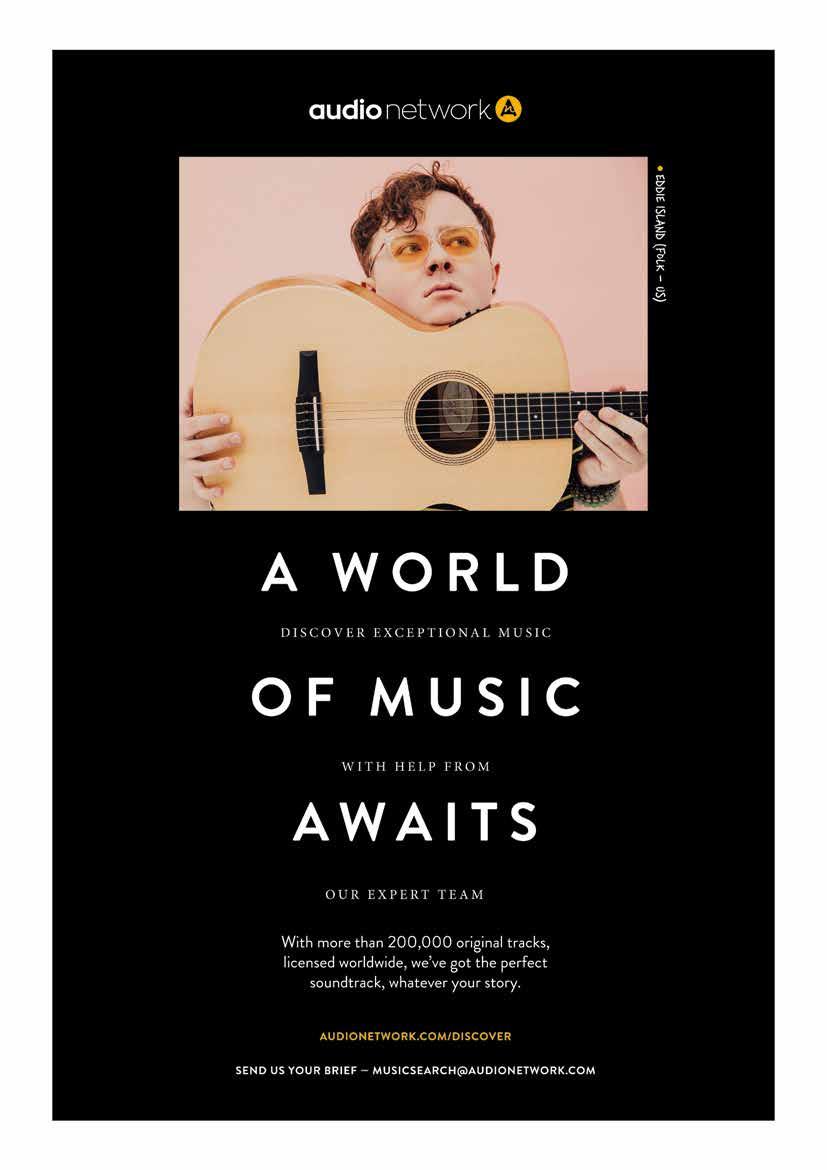
The imminent World Cup has brought to the fore a number of hard and seemingly irreconcilable differ ences. But big sporting events have an uncanny way of connecting with our emotions, regardless of any political dimension.
Ask the Welsh how they feel about Rob Page’s team competing in the Cup and you’re unlikely to hear much about Qatar’s repressive regime. As Wales are participating in their first World Cup since 1958, it’s not surprising that many Welsh supporters are over the moon.
This month’s cover story is Steve Clarke’s interview with S4C’s newish

From the CEO Contents
Chief Executive, Siân Doyle, who intends her channel to make as much noise as possible as the Dragons com pete on the international stage.
It’s a double celebration for Siân as the Welsh-language service marked its 40th anniversary this month. The RTS wishes S4C many happy returns.
Don’t miss Matthew Bell’s piece on what the main UK broadcasters are planning for their Cup coverage.
We’re thrilled to have Sky News’s political editor, Beth Rigby, as Televi sion’s diarist – and relieved she found the time to write it as she continues to navigate the permacrisis and launch a new interview show in which she aims to channel the late, great Brian Walden.
Everyone knows that much more work is necessary to improve accessi bility for disabled people in Britain’s TV sector. Carole Solazzo’s probing feature on workplace changes that have genuinely enabled greater par ticipation in production should be read by all production executives.
The RTS’s national events pro gramme continues to dazzle. On 7 December, Tim Davie will be our very special breakfast guest at St Mar tin-in-the-Fields in London.
Beth Rigby’s TV Diary
Making sense of the permacrisis is the new political normal for Beth Rigby
Comfort Classic: Prime Supect
Matthew Bell rewatches a seminal drama whose all-too realistic characters are mired in an institutionally sexist police force
Ear Candy: The News Agents
Podcasting lets former public service news broadcasters share their opinions as well as facts, notes Harry Bennett
Working Lives: Talent manager

Producers are increasingly anxious to secure good behind-the-screen talent, Julia Hardwell tells Matthew Bell
S4C kicks off a new era
As Wales prepares to launch its World Cup campaign, the broadcaster’s CEO, Siân Doyle, talks to Steve Clarke
Beautiful game turns ugly
Millions of UK fans will watch the World Cup on TV despite its oppressive host, Qatar. Matthew Bell looks at what they can expect to see
Winter World Cup unsettles TV advertisers

Tara Conlan reports on how the so-called ‘golden quarter’ may lose some of its lustre in a tough ad market
Editor Steve Clarke smclarke_333@hotmail.com
Production, design, advertising Gordon Jamieson gordon.jamieson.01@gmail.com
Our Friend in Yorkshire
Lisa Holdsworth hails the non-TV bodies helping to grow the region’s flourishing television sector
Mission possible
A few basic changes can transform the lives of disabled people working in TV – and they won’t break the bank. Carole Solazzo investigates
Recollections may differ
The new series of the Netflix flagship The Crown is provoking fresh controversy over its depiction of real events, says Shilpa Ganatra
ITV turns to the X factor
Claire Enders assesses how audiences and advertisers are likely to respond to the new streaming service ITVX
Trouble in paradise
As The White Lotus returns for a second run, Steve Clarke analyses the unsettling TV satire that dominated this year’s Emmys
TV goes social
The RTS learns how broadcasters have turned to social media in search of new audiences and revenues

RTS news and events
Reports of the Society’s seminars, events and awards ceremonies from around the UK and Ireland
©
3 Television www.rts.org.uk November 2022
The
November 2022 l Volume 59/10
Royal Television Society 2022 The views expressed in Television are not necessarily those of the RTS. Registered Charity 313 728 RTS, 3 Dorset Rise London EC4Y 8EN T: 020 7822 2810 W: www.rts.org.uk Journal of
Royal Television Society
5 6 8 12 20
7
15
18
Cover: Wales captain Gareth Bale (Getty Images)
Theresa Wise
22 24 10 Sub-editor Linda
News editor and writer Matthew Bell
14 16 26
Coffey thelindacoffey@gmail.com
bell127@btinternet.com
Do you need £5,000 for a history of television project?

Grants will be given to assist in the completion of new or unfinished projects, work or literature specific to the objectives of the Trust.
George Shiers, a distinguished US television historian, was a long-standing member of the RTS. The Shiers Trust grant is in its 22nd year.
Application procedure
Applications are now invited and should be submitted to the Trustees by 30 April 2023 on the official application form.
Applicants must read all the conditions www.rts.org.uk/ shiers-trust-award
The Shiers Trust can make a grant of up to £5,000 towards publishing work on any aspect of TV history
TV diary
One of the best things about being the political editor of a rolling 24-hour news channel is breaking news. Nothing feels as vital or as exhilarating as a big political moment, be it a knife-edge vote or the election of a new party leader, and there’s no greater privilege than being the person to relay that news to viewers and dissect what it means.
But as I raced into the Sky News studio at just after 8:00pm last Tues day to break yet another story of an ill-wind blowing through government – this time the resignation of Sir Gavin Williamson – just two weeks into Rishi Sunak’s reign, I felt a prick of irritation. Will this permacrisis ever end?
■ You can see why this word, red olent of living through a period of war, inflation and political instabil ity, has been chosen as Collins Dic tionary’s word for 2022. Sir Gavin’s departure, triggered by allegations of bullying (which he denies), took the total of ministers or whips who have resigned or been sacked from government since the start of this year to 80.
We’ve had two new PMs in seven weeks. There was even a moment when I thought Boris Johnson might make a comeback, despite being kicked out of No 10 in July. Does it get more bonkers than that?
■ I now think of myself as the per macrisis political editor. Since tak ing the job in the spring of 2019, I’ve covered the ousting of Theresa May and the bitter Brexit wars that cul minated in the first winter general election in nearly seven decades.
Making sense of the permacrisis is the new political normal for Beth Rigby
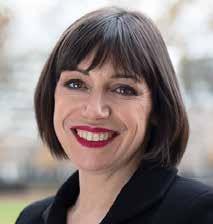
There was the triumph of Boris Johnson and then his messy, pro tracted demise, punctuated by the most astounding debacle of it all – the horror show of Liz Truss’s 45 days at the helm.
■ When I took this job, I thought I might see two prime ministers come and go. Instead, we have had three PMs in four months. My friend and former colleague, Adam Boul ton, did this job for 25 years and witnessed four handovers of power – John Major, Tony Blair, Gordon Brown and David Cameron.
These days, the span of political editors’ careers could be thought of in terms of cat years, since we cover enough politics in one year to count as what feels like seven. “Instability rules,” is how Adam puts it. Sunak wants to steady the ship. But it hasn’t been the most auspicious of starts.
■ On our Beth Rigby Interviews show, we are trying do slower and more in-depth journalism. We’ve just put this week’s show to bed with two interviews, equally compelling in
Sky
different ways. One was with the foreign secretary, James Cleverly, and his wife, Susie, talking about her can cer battle, and the other with former Foreign Office chief Lord McDonald, who helped bring down Johnson.
I’m lucky to have Rob Burley, the former BBC executive and interviews expert, working with me as we try to revive the art of the long-form interview.
■ Our goal is to use interviews as a form of inquiry to illuminate a public figure or a policy issue, rather than trying to chase a viral clip. In the breathless cycle of news, Rob and I want to press pause and try to construct interviews that get to the truth, and tell a story with a begin ning, a middle and an end.
As for the approach, we’ve decided to leave the Jeremy Paxman-style “Why is this bastard lying to me?” to my political editor role and instead embrace the Brian Walden tech nique: “Imagine this person’s telling the truth. What follows from that?”
Using a combination of precise preparation and sincere curiosity, we hope these interviews with public figures from all walks of life can fill a gap in a frenetic news cycle – and maybe one day win us an RTS award!
■ But it’s still frenetic around West minster and, as soon as the show was in the can, we were getting our ducks in a row for a 72-hour dash to Bali for Sunak’s first G20 sum mit, followed by the critical Autumn Statement. The mini-budget proved a defining moment for Truss for all the wrong reasons, so Sunak will want to get this right. Whether it can calm the permacrisis is another matter. I’m preparing to buckle up.
Beth Rigby is Sky News’s political editor.
5 Television www.rts.org.uk November 2022
COMFORT CLASSIC
Prime Suspect
Prime Suspect is a police procedural, one of many over the past decades, and certainly not the first or last cop show to feature serial killers, dead naked women and mean city streets. So far, so what?
But, when Lynda La Plante’s uncom promising creation was first broadcast on ITV in 1991, a nation sat up and noticed, with more than 14 million people tuning in to watch.
Helen Mirren’s DCI Jane Tennison, appointed to head the Met’s murder squad after its boss suffers a fatal heart attack, is treated with contempt and worse by the all-male incident room.

Sergeant Bill Otley, played with venom by the late Tom Bell, declares:
“I’ll make sure she gets screwed up her skinny dyke arse.” A naive colleague responds: “You don’t think she is one, do you?” To which Otley replies: “Do me a favour, what bloke would fancy that?”
TV audiences hadn’t heard language like it before on a cop show. The novelty wasn’t seeing a female officer
in charge; ITV’s The Gentle Touch and the BBC’s Juliet Bravo had got there first. What was new was the viciousness of the misogyny it portrayed and it struck a nerve.
In one brilliant scene, the male officers attend a boozy, black-tie Sportsman’s Charity dinner featuring a brutal boxing bout, to which Tennison is not invited. This is what she is up against, a police force in thrall to male violence and institutionally sexist to its core.
Mirren’s performance is astonishing. She plays a complex, flawed character, who is resilient and courageous, but also vulnerable, yet at times she is as arrogant, dislikeable and narcissistic as the worst of her male colleagues.
The genius of La Plante’s creation is
6
Getty Images/Future/Nicky Johnston
Matthew Bell rewatches a seminal drama whose all-too realistic characters are mired in an institutionally sexist police force
Helen Mirren stars as DCI Jane Tennison in Prime Suspect
Ear candy
that, as a police officer, Tennison is entirely believable – and very male. Fag in one hand, whisky in the other, with an obsessiveness in her pursuit of villains that has led to a messed-up personal life, she is a regendered Jack Regan from The Sweeney
In truth, Tennison was based on Jackie Malton, a senior police officer who met La Plante while she was creating Prime Suspect Malton, who later became a consult ant on other TV cop series, was impressed with the writing but felt it underplayed the sexism that women faced in the police. When she moved to a senior job with the Met, recalled Malton in The Guardian, she was greeted by a new colleague: “Why don’t you fuck off, you cunt – I’m not working with a woman.” In Prime Suspect, this officer became Sergeant Otley.
La Plante, who was born and raised in Liverpool, started out as an actor, even appearing in Z Cars and The Sweeney. Acting in an episode of The Gentle Touch convinced her that she could write more realistic dialogue. The proof was her first hit, Widows, in 1983, in which the wives of criminals killed when a heist goes wrong decide to carry out the robbery themselves.
In a recent interview with The Inde pendent, La Plante said Granada Televi sion “didn’t even want to do [Prime Suspect] to begin with – they hated it”. Granada, she says, thought that Tennison “was so unfeminine. I even got a note saying, ‘Oh god, she touches the dead body.’ They dismissed it.”
Granada changed its mind and, for its first run, Prime Suspect won three RTS Awards: Single Drama; Actor – Female, for Mirren; and Writer, for La Plante. It then ran for seven series until 2006.
Prime Suspect was groundbreaking, and other uncompromising dramas such as Cracker and Between the Lines followed. Its legacy is surely that mod ern-day cop shows with female leads – Suranne Jones and Lesley Sharp in Scott & Bailey, Sarah Lancashire in Happy Valley and Nicola Walker in Unforgotten – seem so entirely normal. n
Prime Suspect is available on ITV Hub now, and on ITVX from 8 December.
In August, former BBC heavy weights Emily Maitlis, Jon Sopel and Lewis Goodall stepped into the podcast ring with The News Agents, promising a new type of daily news show.
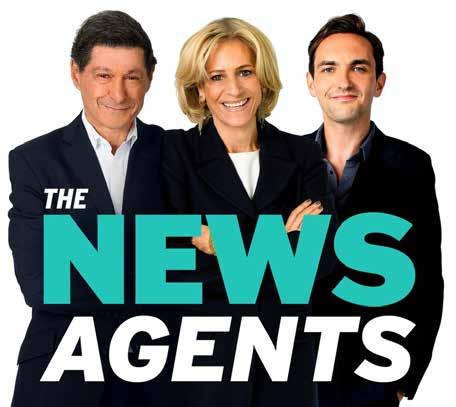
In a clear statement of intent, a recording of Maitlis’s headline-making MacTaggart Lecture, in which she decried the BBC’s version of “impar tiality”, was published under the title before the launch proper.
In other words, this time it’s partial. Some were sceptical about the appetite listeners would have for the opinions of these erstwhile public service journalists but The News Agents has taken up permanent residence around the top of the charts, alongside that other opinionated podcast, Alastair Campbell and Rory Stewart’s The Rest Is Politics
Although the two share a similar casual, chummy tone, the The News Agents’ focus is more on news agen da-setting than political reflection. Every weekday, they pick a domestic or global headline – the UK migrant crisis, Elon Musk’s Twitter takeover, the Qatar World Cup – to explain
and analyse, consulting experts where needed.
The Qatar episode featured one of their biggest guests yet, Gary Lineker, who discussed his and the BBC’s upcoming coverage of the tournament. Maitlis and Sopel are experienced interrogators, and it’s a credit to their probing that Lineker spoke out about the importance of covering human and workers’ rights issues in Qatar to prevent the “sportswashing” of the host country.
Meanwhile, these battle-scarred news folk are revelling in their new found independence. A recent episode on the Just Stop Oil movement began with Maitlis and Sopel going headto-head for a full 10 minutes over the efficacy of extreme protest.
Which is to say that they are the stars of the show. Whether you adopt it as your daily newscast will depend on whether you prefer their company – or at least value their opinions – over all the alternatives, including the deeper and better-produced documentaries of The Guardian’s Today in Focus or The New York Times’s The Daily. I know I don’t. n Harry Bennett
7 Television www.rts.org.uk November 2022
Global Player
WORKING LIVES Head of talent
Julia Hardwell worked on classic kids’ programmes such as Art Attack and Blue Peter before moving into production management at the BBC and then talent management at ITV.
She is now head of talent at leading factual independent producer Arrow.
What does the job involve?
I source the off-screen talent for productions across Arrow Media and Arrow Pictures, including runners, researchers, assistant producers, directors, series producers and execu tive producers. I also recruit people to permanent positions in the company; we have about 25 core staff. My role includes all aspects of HR.
Do you recruit on-screen talent?
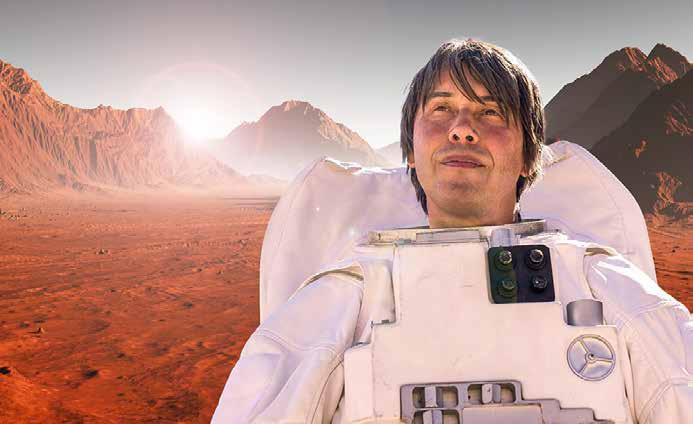
No, talent agencies and broadcasters tend to look after the on-screen talent.
What was your route into becoming a talent manager?
I did a drama degree and my first role in TV was as PA to Neil Buchanan, the presenter of CITV show Art Attack. It was made by The Media Merchants,
a really nice, small indie that was based in Kent, my home county. From a young age, I’d wanted to work in kids’ TV. I then moved into production management, spending 10 years at the BBC, which is an excellent place to train. I spent a little time in studio management and then moved into talent. Throughout my career, I had always enjoyed recruiting and nurtur ing people, so it felt like a natural step.
What was your first talent job?
It was in the ITV entertainment team, recruiting people for “shiny floor” shows and doing a lot of casting. I then became talent manager at Arrow, a specialist factual indie working for broadcasters across the globe.
Would this role be very different if you were working at a big broadcaster rather than an indie?
The actual job isn’t hugely different, although at Arrow I’m often looking for people with specialist knowledge in science or history for one of our docu mentaries, or who know about fluffy animals – we’re currently making
Magic of Disney’s Animal Kingdom for Disney+. In a typical year, Arrow makes more than 100 hours of programmes, so there’s always a lot going on.
What makes a good talent manager?
You need to like talking to people. When it comes to recruiting, you need to be able to see the potential in people and how they can progress. It’s notori ously difficult to get a start in the industry as a runner, but I look at a lot of people who have skills that are not TV-related but are transferable; they could have good customer service skills from working in a coffee shop.
So, it isn’t necessary to have a degree in something telly-related?
I’m not a huge fan of TV degrees – some universities don’t teach students about the way the industry operates. Don’t be put off if you haven’t got one; I’m open to people from all backgrounds.
Which people do you work with closely at Arrow?
I have a talent team, which consists of a talent co-ordinator and a talent/HR
8
BBC
Brian Cox: Seven Days on Mars, made by Arrow
assistant. I work closely with our heads of production and executive producers.
When do you start to hire for a shoot?
As soon as I get a hint of a new project, I start to look at people to fill the roles – quite often it’s very last minute, with only a week or two before a produc tion starts. We tell people a job is com ing up or pencil them in, but you can’t confirm a job until it is commissioned – it can be a real juggling act.
How do you crew for shoots abroad?
Arrow makes a lot of content in the US. Before Covid, we used to send our teams out from the UK, although they were usually quite small, just a pro ducer/director and assistant producer, because our productions often involve a lot of interview shoots. Because of Covid, we have started using more US crews. In the future, we will be doing both.
What is a typical working day like?
I can guarantee I will be spending a large part of the day on Microsoft Teams in meetings with Arrow staff.
We have a hybrid working arrange ment at the company, with people working from home two or three days a week. I also have lots of conversa tions with freelance talent.

Do you try to develop the skills of freelancers?
We are proud to offer a lot of training to freelancers, which few indies do. We have recently run a production co-ordinator training course, another on researcher skills and some training in soft skills, such as managing people and relationships. I like helping people take their next steps and develop their careers, particularly those in junior roles.
What do you bring to work with you? I’d be in trouble without my notebook.
What are the best and worst parts of the job?
I really like solving the jigsaw puzzle of staffing. Across the company, there are a lot of productions on the go at once and I enjoy working with my talent team and heads of production to work out who fits best where. The worst is
letting really good people go when you don’t have anything for them.
Is looking after the mental wellbeing of TV talent becoming more important?
It is a difficult industry for a freelancer, and Covid has had a major effect on our regular freelances, many of whom were out of work for some time. At Arrow, we tried to keep people on for as long as possible. We also have an anti-harassment and anti-bullying policy, and a disciplinary process. Mental health is something we take very seriously.
How has the job changed since you started?
It’s a lot more difficult to find people now – in particular, you just can’t find good, available production managers. The big streamers can pay a lot of money so, for the smaller indies, where you don’t have the budget to pay the streamer rates, it makes things diffi cult. At Arrow, we make a number of long-running crime series for the US, which means we can offer long con tracts – that can be attractive. The training we offer is a big pull, too, and we are such a nice place to work!
As a talent manager, what advice would you give to a young person wanting to break into TV?
Network – reach out and connect with people; that’s the way of the industry. It’s really difficult to get in when you don’t know anyone. There are some really good runners’ groups offering advice on Facebook for people who are starting out. n
Julia Hardwell was interviewed by Matthew Bell. See the report from an RTS Futures networking event with talent managers on page 31.
9 Television www.rts.org.uk November 2022
‘IT’S A LOT MORE DIFFICULT TO FIND GOOD, AVAILABLE PRODUCTION MANAGERS’
Disney+
Magic of Disney’s Animal Kingdom, made by Arrow
S4C kicks off a new era
When Wales play their opening World Cup game in Qatar later this month, few sup porters will be cheering on the national team as fer vently as Siân Doyle, the Chief Execu tive of S4C. She needs no reminding of the campaign’s significance to the Welsh-language channel, which, in a happy coincidence, celebrated its 40th anniversary on 1 November.
“For us, the World Cup is enormous,” she says with palpable enthusiasm. “S4C is the home of Welsh football, so qualifying for the first time in 64 years represents a huge opportunity for us to be on the global stage. It’s being trailed as the biggest event in Wales – ever.”
A special lineup of documentaries, music, entertainment and current affairs shows is being scheduled to complement the football. As well as being shown on S4C, this content will also be available on S4C Clic and BBC iPlayer, with a range of shorter-form content on YouTube and across social media platforms.
On 20 November, the eve of Wales’ opening game with the USA, S4C will show a special concert from New York starring such Welsh luminaries as Bryn Terfel and Ioan Gruffudd. Expect Times Square to turn red.
Alongside drama – S4C enjoys a global reputation for its signature Celtic noir crime series – and chil dren’s (S4C’s first programme was SuperTed), sports are a key priority for the CEO as she navigates the next stage in the broadcaster’s evolution.
Doyle, who took over in January, was part of the team who ensured that live, free-to-air men’s football would remain on S4C in the Welsh language until 2024, following a deal with Uefa.
With the World Cup approaching, she sounds ebullient as we chat over Zoom. Earlier in the week, she had attended Channel 4’s own celebratory dinner at London’s V&A to mark its 40th birthday. S4C may be considera bly smaller than its more high-profile cousin – when the service launched in 1982, Channel 4 shows were a regular part of its schedule – but, culturally, it is hard to underestimate the role the broadcaster plays in Welsh life.
Doyle, who read history and politics at Cardiff University, where she met her future husband, grew up in a Welsh-speaking family in Wales, so not only did she watch S4C during
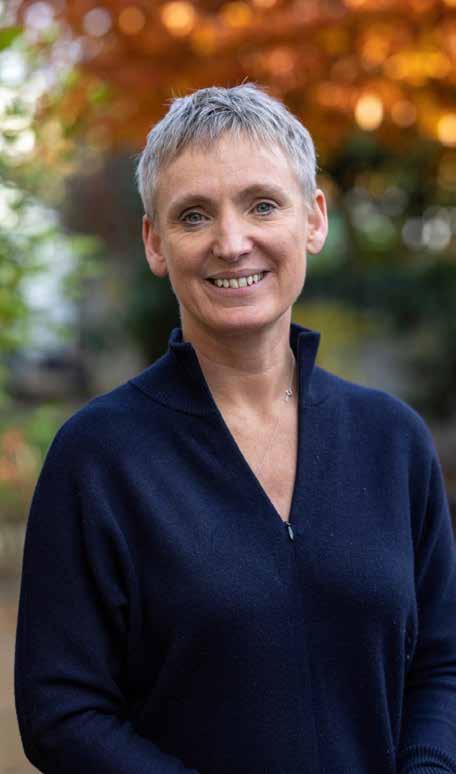
10
As Wales prepares to launch its World Cup campaign, the broadcaster’s CEO, Siân Doyle, talks to Steve Clarke
S4C
her formative years, but she had an insider’s view of the struggle to ensure that a Welsh-language TV channel was established.
Her family had campaigned for the creation of a Welsh-language service. Later, when she worked in North America, she would watch S4C to help “keep the Welsh language alive”.
For those unfamiliar with the history of what became S4C, it is worth recall ing that Margaret Thatcher’s adminis tration, despite previously promising a Welsh-speaking TV channel, decided to drop the idea. The then Prime Min ister only took it up again thanks to a campaign of civil disobedience that extended to attacks on transmitters in the Welsh-speaking heartlands and a
overseeing 800 shops, before moving to the US to do a similar job for Com cast at the time the company was tak ing over NBCUniversal. As senior vice-president of Comcast Cable, Doyle built a chain of retail stores and set up an e-commerce business.
On returning to the UK, she initially did some consultancy work, then took a job as head of TalkTalk’s consumer operation. She accepted a severance package when the company was sold to a private equity group.
The idea was to live in Wales and retire. Her friends, she recalls, were sceptical: “They all said, ‘There’s no way you’re ready to retire.’”
When she was first approached about the S4C job, Doyle was reluctant.
At S4C, Doyle has hit the ground running. She has reshaped her com missioning team, hired fresh talent (BBC One Final Score host Jason Mohammad will be fronting a docu mentary in Qatar and an international co-production, Stadiymau’r Byd/Stadiums of the World), and focused on a new plat form strategy to reach those elusive younger audiences with what she describes as “bold commissions”.
Dal y Mellt/Catch the Lightning, a new heist drama, has attracted interest internationally, and a second series of Yr Amgueddfa will drop as a box set on Boxing Day (series 1 was sold to Brit Box US and Canada and AXN in Japan). The recently launched Gogglebocs Cymru has been a big success, bringing
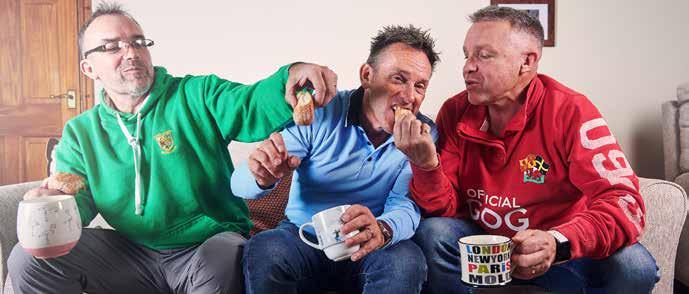
threatened hunger strike by former Plaid Cymru President Gwynfor Evans.
Today, in the very different atmos phere of a devolved Wales, it is esti mated that 29.5% of the population – about 892,000 people – are Welsh speakers; the target is to have 1 million by 2050. S4C is crucial to achieving this. Its dedication to children’s programmes, especially those for pre-schoolers, has been and continues to be vital in encouraging the spread of the Welsh language.
Running S4C is Doyle’s first job in broadcasting and follows a 25-year career as a high-flyer in retail, initially at Asda in Leeds, where she worked as a buyer, and running stores for such supermarket luminaries as Archie Norman and Allan Leighton.
The closest she came to broadcast ing was when she ran the retail divi sion of the telecoms company Rogers Communications in Canada,
For a start, she had never done busi ness in Welsh and had no TV experi ence. But, as she thought about the job description, she began to realise that her career had given her the skillset for which the S4C board was looking.
“Of course, I was flattered to be approached,” Doyle says. “S4C is an amazing organisation… The more I thought about it, I realised that, at S4C, you need to create something audiences want. I’d done that with customers at supermarkets and tele coms companies.
“People are just consuming in a dif ferent way. I tried to keep it as simple as that in my head. I thought: ‘I’ll have to work with the right people, who understand about making programmes but, at the end of the day, I do under stand quite a bit about digital and data…’ It took me a while to convince myself to apply because you don’t want to fail.”
a distinctive Welsh flavour to the format.
There is also the previously men tioned football deal and the fanfare around the World Cup.
“A lot of the work has been about setting out what our priorities are,” Doyle explains. “Once you know what your priorities are, it’s a lot easier to mobilise around that.
“We’re in a world where the land scape is changing so fast. My prede cessor, Owen Evans, secured a financial settlement from the Govern ment that meant we could start mov ing our digital agenda. You’ve no choice in that because that’s where your audience is. We’ve got to ensure we are meeting that with the right platforms.”
And if Wales makes it through to the knockout stages of the World Cup, Siân Doyle is unlikely to stop celebrating until the New Year. n
11 Television www.rts.org.uk November 2022
S4C
Gogglebocs Cymru
Beautiful game turns ugly
First Russia in 2018 and now Qatar: the World Cup appears to be on a tour of the world’s least savoury destinations. There has been wide spread condemnation of the exploita tion and deaths of migrant construction workers – thought to number several thousand – in building new stadiums for the tournament and other major projects, and of Qatar’s criminalisation of same-sex sexual activity and severe restrictions on women’s rights.
As many critics, from inside and outside football, have pointed out, the beautiful game has turned ugly. And, as I write, a Qatar World Cup ambassa dor has caused outrage by describing homosexuality as “damage in the mind”.
But this is football, and so the show must go on. Despite their reservations, millions of fans from around the world – me included – are going to be glued to their TV sets for the next month.
For broadcasters, which means the BBC and ITV in the UK, Qatar offers some tricky challenges.
World Cups are generally played in June and July, but the extreme summer heat of Qatar made a move to winter inevitable. Domestic professional leagues grumbled at the interruption to their seasons and some threatened legal action, but the World Cup band wagon rolled on.
“It goes out at a time when, in televi sion terms, there are a lot of other big entertainment hits around,” admits Philip Bernie, head of TV at BBC Sport. “Clearly, there’s a degree of reliance on the progression of the home teams, England and Wales, [as] to just how big it gets but, irrespective of that, there are large audiences for these big
football tournaments, and we fully expect that to be the case here.”
Niall Sloane, ITV director of sport, says: “The World Cup is the biggest sporting event of the year and ITV is committed to [bringing] viewers the very best, extensive coverage.”

This World Cup, explains Bernie, will see “unprecedented and very welcome collaboration between the BBC and ITV…. We’re both using the same stadi ums, so it makes an awful lot of eco nomic… and practical sense to share technology. We’ve got a very good relationship with our colleagues in ITV; of course, there’s proper rivalry when the tournament starts.”
As it has since the 2002 World Cup in Japan and South Korea, Host Broad cast Services will deliver sound and images from games. The BBC and ITV will take its live match feeds, adding their own commentary and punditry.
“We’re splitting the operation in a way we’ve never done before, between Salford and Qatar,” explains Bernie, who is flying out to Qatar shortly before the tournament starts. “The
12
Millions of UK fans will watch the World Cup on TV despite its oppressive host, Qatar. Matthew Bell looks at what they can expect to see
Getty Images
England captain Harry Kane
presenting team, with some support from production, will be out in Doha; the back engine in Salford.”
Remote production is growing rap idly in televised sport, driven by tech nological advances and by broadcasters attempting to “green” their activities. “We are all trying to play our part in [developing] more sustainable produc tion,” says Bernie. “There are clearly now ways that you can do a very large part of production remotely.”
Nevertheless, the BBC has no plans to keep its on-screen talent, the presenters and pundits, or commentators at home. TV audiences, says Bernie, want “to savour the atmosphere and flavour of the tournament and that is best achieved if the key people involved in broadcasting it are right in the middle of [the action]…. Commentators need to be seeing the field of play.”
Yet the condemnation of Qatar as World Cup host continues. Even for mer Fifa boss Sepp Blatter has admit ted that the award was “a mistake”.
Players and supporters are also showing their disapproval. Denmark’s kits include an all-black shirt to hon our migrant workers who died build ing the tournament’s stadiums, while Harry Kane is one of several European team captains planning to wear a “one love” armband to protest against LGBT+ discrimination. In Germany, Borussia Dortmund, Bayern Munich and Hertha Berlin fans held up “Boycott Qatar 2022” banners at recent Bundesliga matches.
If there are similar protests in and outside stadiums in Qatar, how will the UK’s broadcasters react?
An ITV spokesman says: “Our jour nalism will be robustly independent. ITV’s World Cup… coverage will focus on the football but will not shy away from controversies off the pitch.”
The BBC’s Bernie says there has already been “considerable coverage” of “workers’ rights, as well as the treat ment of women and diverse commu nities [including] LGBT+ [people]”.
He continues: “The BBC does not have a role in deciding where an event should be staged, but we have a proven record of addressing topical issues as part of our coverage… and this World Cup will be no different.
“If something happens in the stands, if stuff is seen, we aren’t going to shy away from it…. If there are stories off the pitch that need to be dealt with in a proper journalistic manner, of course we’ll deal with those stories as well.” n
The World Cup on the box
For ITV and the BBC, the World Cup is a marathon, not a sprint. Between them, they will broadcast 63 matches live up to the 64th, the final, on 18 December, which they will share. But which broad caster promises the best coverage?
Since the days of Brian Moore, Barry Davies and John Motson, commenta tors have become a rather faceless bunch. Both ITV and BBC offer solid professionalism; expect a score draw.
ITV’s roster of pundits mixes the pugnacious, Roy Keane and Graeme Souness, with the erudite, Gary Neville, and an encouraging number of women, Karen Carney, Eni Aluko and Nadia Nadim, as well as the inimitable Ian ‘Wrighty’ Wright’. Mark Pougatch is the dependable main presenter.
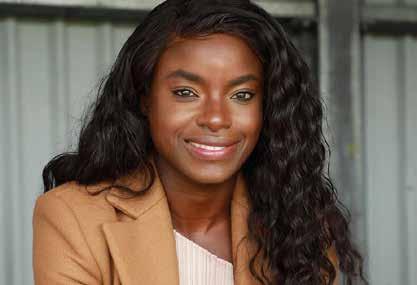
Co-commentators include the excellent Ally McCoist and Lee Dixon. Former players Hal Robson-Kanu and John Hartson will be involved on Wales match days, though the international punditry bench – just former Paris Saint-Germain player (and medical doctor) Nadim and former Dutch mid field enforcer Nigel De Jong – seems a little under-populated.
The BBC, whose coverage is fronted by pun-tastic national treasure Gary Lineker, has the opening game on 20 November, Qatar vs Ecuador; per haps one for the cognoscenti.
As with ITV, its pundits are famil iar and include Alan Shearer, the ever-enthusiastic Micah Richards, Rio Ferdinand and, following Wales, Ashley Williams, Ian Rush and Danny
Gabbidon. Jürgen Klinsmann, Gilberto Silva and Vincent Kompany are just some of the international experts.
ITV will be eyeing up the advertising revenue for England’s group game against the US on 25 November in a prime-time 7:00pm slot. At last year’s Euros, England’s semi-final against Denmark drew a peak audi ence of 27.6 million.
The BBC is showing England’s other two group games, but ITV has first pick for the round of 16 and quarter-finals –though, of course, Gareth Southgate’s boys may not make it that far. The BBC has first choice of the semis.
Sky, the home of the domestic Premier League for three decades, is frozen out of the World Cup, which is a ‘crown jewel’ event and reserved for free-to-air TV. But it is offering three meaty documentaries: Italia 90: Four Weeks that Changed the World; Hurst: The First and Only; and Brazil 2002
More parochially, S4C focuses on Wales, making their first appear ance at a World Cup in 64 years. All Wales matches will be shown on the Welsh-language channel, which is also airing supporting documentaries, such as Bois 58, a look back at the 1958 tournament, when the nation reached the quarter finals.
Pointedly, S4C will also screen a special edition of current affairs series Y Byd ar Bedwar: Cost Cwpan y Byd Qatar, focusing on the poor conditions faced by Qatar’s construction workers and the country’s human rights record.
13 Television www.rts.org.uk November 2022
ITV
ITV’s Eni Aluko
Airing the World Cup over November and December for the first time ever is playing havoc not just with the Premiership calendar, but with the UK’s TV ad market, too.
Moving the tournament from the summer to mitigate the extreme heat of the host country, Qatar, has dented ITV’s advertising revenues for the year to date.
It may also have taken some of the gloss off advertising’s “golden quar ter”, named because it includes the run-up to Christmas. In a typical World Cup year, ITV’s advertising gets a boost in the summer, plus the usual festive bump. This year, campaigns for the two events are colliding.
Earlier this month, ITV reported a 14% fall in third-quarter ad revenue, while the year to September was down 2%. Not surprising, given that last year’s Euros and a strong postCovid bounce have been superseded by a cost-of-living crisis and economic turmoil fuelled by chaos at Westmin ster and the war in Ukraine.
It means advertisers have had to think creatively about how to juggle Christmas and the World Cup while also being sensitive to consumers’ cost-of-living concerns.
Several key advertisers have com bined their campaigns. ITV’s director of sales and commercial partnerships, Mark Trinder, says some of his biggest customers have definitely been “wrestling with the cost of living and their own media budgets”. He says ITV is being as flexible as it can with bookings.
The challenge, he says, has been “to straddle the World Cup and Christmas communication. To do two bespoke [campaigns] at the same time is diffi cult for many. One creative conversa tion can straddle Halloween, Bonfire Night, the World Cup and Christmas itself. The main creative theme has been about getting people together.”
He highlights Aldi linking the World Cup to Christmas by having its
Winter World Cup unsettles TV advertisers
advert’s character, Kevin the Carrot, miss a flight to the World Cup.
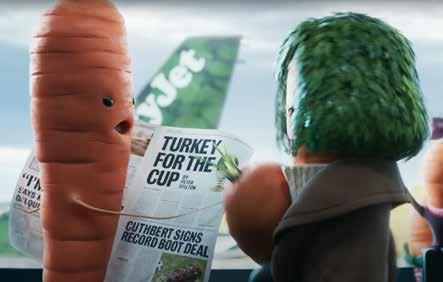
Trinder is optimistic about the fourth quarter: “We’ve seen good demand based on the World Cup.… Most categories are pretty well repre sented. Fast-food delivery companies, retail, technology, mobile telcos, FMCG [fast-moving consumer goods] and travel are very strong. I’m a Celeb rity… is absolutely rammed with Christmas ads.”
He says the December launch of ITVX is “a real opportunity for us” to increase ad revenue.
Nick Waters, CEO at Media consul tancy Ebiquity, agrees that ITVX’s capacity to provide more targeted ads and data “represents a real opportu nity for TV to fight back and start bringing money into TV that has migrated to online”.
He adds: “I don’t think ITV will enjoy the same boom around this World Cup as it has in previous World Cups, but I do think ITVX is a very good proposition. Money [coming] into ITVX will not compensate for all the money that could have flowed
into the World Cup, but I don’t think this fourth quarter is going to be bad….
“I suspect it will be fairly flat year on year… I think there’s a great deal of caution in Q4… it’s more about budget maintenance than a budget surge.”
Waters argues that, going into a tough 2023, TV will provide the best result for brands’ long-term market share. But he notes: “There’s just no appetite for brands to promote them selves in relation to the World Cup now. People usually get very excited about it, it’s the big thing in the sum mer, between football seasons [but] there are the issues surrounding Qatar’s human rights [record] and migrant workers’ deaths [plus] inter rupting… domestic football seasons, which is causing a lot of irritation.”
Trinder denies that any advertisers have “approached me or my team explicitly saying they were vetoing the World Cup.… There might be some brands that have made that decision and we’re not aware of it. What I can tell you, hand on heart, is that the categories and brand accounts we’d expect are [all] there.” n
14
Tara Conlan reports on how the so-called ‘golden quarter’ may lose some of its lustre in a tough ad market
Aldi’s Christmas ad campaign Aldi
YORKSHIRE OUR FRIEND IN
If you look at the schedules, it would be reasonable to assume that everyone in Yorkshire goes about their day-to-day life followed by a camera crew. It seems we have every profession covered, including vets, farmers, mid wives, shepherdesses, auctioneers and airport workers.
In addition, Yorkshire continues to inspire writers like me to write shows such as Gentleman Jack, Ackley Bridge, Hullraisers, Happy Valley and, of course, Emmerdale, which recently celebrated 50 years of being filmed in the region.
The big broadcasters are here: Sky, the BBC, ITV and Channel 4, and we have a plethora of smaller production companies and facilities. However, there are other participants who help Yorkshire maintain its flourishing TV ecosystem.
Our universities are working hard to develop new talent in the region. I’ve seen evidence of that as I have been involved with RTS Yorkshire’s Student Television Awards for more than 10 years.
Across the board, there has been an extraordinary improvement in the quality and professionalism of the films. And when it comes to handing out the awards in February, we can guarantee that representatives from most of the local production compa nies will be there, hoping to snap up fresh talent.
The region’s industry is also sup ported by our local authorities, which understand that TV and film produc tion bring jobs and money into the area. Tracy Brabin, the West Yorkshire Mayor, is a TV veteran herself, having been an actor and writer before she entered politics.
Leeds City Council is an excellent example of an industry-friendly authority, having supported the suc cessful bid for the Channel 4 HQ. It helped fund the building of Versa Studios in central Leeds, which has doubled the city’s studio and produc tion space. It has also attracted some big players to the region, including Marvel Studios.
It will be odd to see Leeds and Halifax doubling for Moscow when Secret Invasion is released later this year. I never thought I’d see Nick Fury walk down The Headrow. The six-part series stars Samuel L Jackson – who plays Fury- Emilia Clarke and Olivia Colman.
Finally, we cannot underestimate the influence of Screen Yorkshire. It has been supporting film and TV production in Yorkshire and Humber for more than 20 years. Its Yorkshire Content Fund provides production
finance that has encouraged produc ers from across the globe to film in the county. It also delivers training and development programmes with partners such as ScreenSkills, the National Film and Television School and the British Film Institute to improve the skills and diversity of Yorkshire’s TV workforce.
Diversity and inclusion are now not only desirable for our industry; they are imperative. Audiences are demanding authentic stories that reflect their lived experiences, their families and their communities. If we don’t attract people from previously overlooked communi ties into our industry, we only have ourselves to blame when TV ceases to be relevant and younger viewers migrate en masse to platforms such as TikTok to find relatable content.
However, the pace of change is maddeningly slow. It could be that the time for schemes and competi tions has passed and we all need to take a long, hard look at our own offices, production teams and writers rooms. It is important that we recog nise the physical and mental barriers that block access to our industry. And then we need to tear them down.
When I graduated from university in London, I was warned that return ing to Yorkshire would stifle my career and I should stay in the metropolis. It was a load of rubbish back then and it certainly is now. I’m proud to be part of a true community of programme-makers, educators and civil servants who work together to produce some of the best TV in the world. Made in Yorkshire. n
Lisa Holdsworth is a screenwriter whose credits include Ackley Bridge, Call the Midwife and Waterloo Road and is Chair of RTS Yorkshire

15 Television www.rts.org.uk November 2022
Lisa Holdsworth hails the non-TV bodies helping to grow the region’s flourishing television sector
The Haworth Agency
Mission possible
the hugely successful The A Word –given a primetime slot, disabled representation and the working envi ronment of disabled creatives on- and off-camera is in the spotlight.

Twenty-two per cent of the UK population is disabled, and, according to Edgar, 70% of them are “hard of hearing, have mental health issues, are neurodiverse [or] learning disabled. Plus 1.5 million people have some experience of deaf-blindness…. These are huge groups of people.”
So why aren’t disabled people more visible? And why isn’t more provision made for them in terms of access?
Cherylee Houston of Triple C, an organisation that helps disabled people to access the arts and media, suggests one reason: “I’d say, for anyone who’s not worked with a d/Deaf**, disabled or neurodivergent person before… there’s a fear of getting it wrong.”
Edgar agrees: “People don’t want to come across as politically incorrect… and, as a result, you get a lack of engagement with disability, and a misunderstanding of it.”
“We need to take away the stigma and mystery behind it all,” says Jordan Hogg, who directed Ralph & Katie. “If people ask [about my disability], then you can inform them, and everyone can work better as a unit.”
However, Houston thinks some people will find this intrusive. Instead, she suggests, “Ask: ‘What are your access needs?’”
Producer Jules Hussey agrees but goes further: “There’s a fear of [a pro duction] costing more, not being able to get the money from funders, and having to bear the burden of the costs.” But, she argues, this “is a myth”.
Disabled writer Tom Wentworth says the fear is: “We’re going to be very expensive because we’re going to need all these ‘special things’… and we’re going to have demands and be difficult.”
Everyone’s heard of the Bechdel test*, right? Pos sibly the “DuVernay test”, too, as a measurement of the representation of people of colour in TV shows and films. Maybe even the “Vito Russo test” for gay and lesbian representation.
* The Bechdel test is a well-established measure of the representation of women in film.
But what about the “Edgar test”, for disabled talent?
Justin Edgar of production company and disability training provider 104 Films, who is himself disabled, invented the rules when challenged by BBC Radio 4’s The Film Programme
Now, with Peter Bowker’s BBC One drama Ralph & Katie – a spin-off from
** Deaf with an upper-case D refers to a person with profound or total hearing loss and/or a member of the Deaf community
In fact, nothing could be further from the truth. On Ralph & Katie, says Hussey, who produced it, the vast majority of those adjustments, such as “accessible toilets, easy-to-read call sheets, signage and name badges”, came with a tiny price tag.
“We made all the sets wheelchairaccessible,” Hussey adds. “It didn’t cost us any more money. We just said, when they were building the set: ‘Make
who identifies as culturally Deaf; deaf with a lower-case D generally refers to a person with significant hearing loss.
16
BBC
A few basic changes can transform the lives of disabled people working in TV – and they won’t break the bank. Carole Solazzo investigates
Ralph & Katie
sure it’s wheelchair accessible’. Which you should do anyway, because then the camera and everything can get in more easily.”
In other words, access adjustments benefit everyone. Creative coach Jess Mabel Jones, of Access All Areas, agrees. Indeed, she believes there are already many “learning disabled and neurodivergent people working in the television industry, it’s just that… they have felt too scared to ask [for what they need] because they’ve been afraid of being told off, or not employed again”.
Hussey and autistic director Rebekah Fortune, of Seahorse Films, both strongly believe in having “access

were…. This runner was ‘their person’.” Fortune believes in starting early: “A lot of people who are emerging make smaller budgets work, so, by the time they [move] into bigger TV work, [disa bled] actors are used to [working in this way]. It’s helpful – it means it’s not overwhelming.… The same with crew. If, since leaving film school or uni, crew members have been working with disabled actors, by the time they get on a big TV show, they know how to be.”
Houston shares this view, and Tri ple C and its Disabled Artists Network ing Community are playing a big part in “skilling up the community at the same time as having those key conver
Hogg notes: “On Ralph & Katie, we asked everyone who came in the door, ‘What do you need to make your job better?’”
Enter organisations such as Triple C, 104 Films and learning-disability theatre group and consultants Access All Areas, which helps disabled talent to compile “Access Riders”, and pro vides productions with specialist train ing and on-set acting coaching.
Autistic actor Leo Long is an enthu siastic recipient of their support as co-lead on the recent Netflix feature success I Used to Be Famous. “I am very much a visual learner,” he says. “Tricia [Hitchcock of Access All Areas] created visual material, including scene break downs and a storyboard for rehearsals and shooting, to help me understand [director Eddie Sternberg’s] ideas.”
Access All Areas’ toolkit of personcentred coaching techniques is based on years of experience working with disabled creatives, consulting on shows such as Holby City and Hollyoaks, and is backed up by thorough academic research.
“Once production co-ordinators have had some training”, creating doc uments such as Easy Read call sheets “is quite straightforward”, says artistic director Nick Llewellyn.
champions” on set – which, again, adds nothing to the budget.
“TV is a hugely risk-averse industry,” says Fortune. “That applies to employ ment as well as ideas – we all work with the same people…. But, on Ralph & Katie, I asked every head of department [to employ] at least one disabled or neurodiverse person on their team.”
The access champions were then “just another member of the crew but with lived experience. If [a crew mem ber], for example, was diabetic and wanted someone to keep an eye on them, there’d be someone in the crew to do that. None of that cost money.”
On Bebe AI, Fortune’s two lead actors, both of whom have Down’s syndrome, had “a runner specifically for them. The day before [shooting], they palled up, so the actors felt confident with this runner, and the runner’s job was to look after what they needed – a drink or toilet break, [to make sure] that they knew where the toilets
sations”. Of course, some roles will add to the budget.
But, says Houston: “If you’ve thought about it from the start, and [access provision] is built in, it doesn’t cost that much.” She points out: “All the main broadcasters and some SVoDs have developed the ‘5 As’ – Anticipate, Ask, Assess, Adjust, Advocate – for how they expect inclusion to be built into productions.”
This comes after the latest data from Project Diamond, which aims to moni tor and report on diversity in broad casting, showed that only 8.3% of on-screen contributions to TV pro grammes shown in 2020-21 were made by disabled people, and just 6% of crews on TV are disabled.
“It’s about talking to your commis sioners, who will be able to advise,” Houston adds. And asking the individ ual disabled creatives themselves. “There’s no ‘one-size-fits-all’,” Fortune insists.
In terms of casting, he says: “Put some money aside to pay a creative coach for autistic and learning-disa bled actors; £60 to £100 is not a huge cost. If they get the job, some [actors may] have government Access to Work funding… we can help put in applica tions. And when it comes to a creative coach, yes, it costs money. But we pay for intimacy co-ordinators now. It’s just one extra person… it’s not going to break the bank.”
“We rehearsed, rehearsed, rehearsed,” says Long, quoting from the film. “Tricia made sure I had a quiet space where I could… keep calm if I felt very anxious or over-tired. [She] provided me with feedback and… made it great fun, too…. I’m very proud of my performance.”
And the Edgar test rules?
Edgar advises: “1) Disabled charac ters should be played only by disabled actors; 2) The show should be either written by a disabled writer or directed by a disabled director; 3) The disabled character should not have to overcome adversity; 4) The disabled character [should not be] ‘able-bodied’ at the start or at the end of the show.”
How will your next production measure up? n
17 Television www.rts.org.uk November 2022
Faithful Films
Bebe AI
Recollections may differ
If four series of lavish produc tion and high-stakes storylines about the upper echelons of the aristocracy weren’t enough to whet appetites for series 5 of The Crown, the recent death of Queen Elizabeth II will have piqued yet more interest in Netflix’s flagship show.
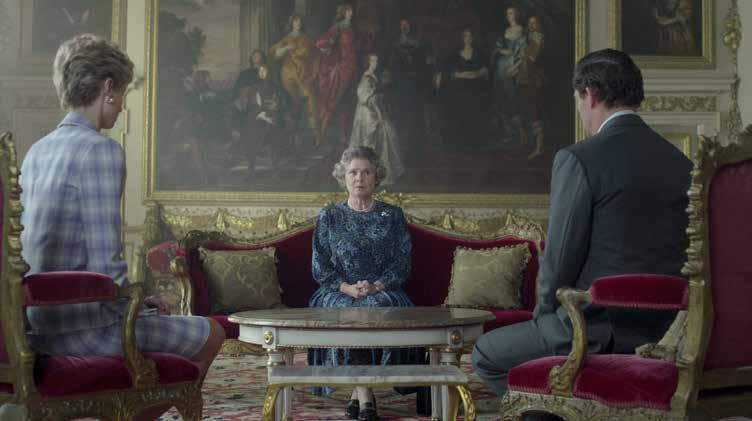
In the days following the monarch’s death, The Crown’s audience rose more than 800% in the UK, according to data analytics firm Whip Media. This is a reminder, if one were needed, of the strong emotional connection many viewers feel to the British Royal Family.
This point is taken up by Jonathan Pryce, who plays Prince Philip in the new series: “I remember watching the coronation on a tiny black-and-white television two days after my sixth birthday. We got the television espe cially for the coronation.” To block out the daylight, he says: “My mother got out the blackout curtains that they’d had to put up during the war….
“I lay on my stomach watching it, with a tiny cannon that fired match sticks, which I’d been given as a birth day present. Whether this was the precursor to being a republican or not, I fired my cannon towards the corona tion. They fell far short, they didn’t kill anyone,” he says with a chuckle. “When you’re watching The Crown or royal documentaries, there’s something quite extraordinary about how you can relate to it emotionally.”
In series 5, we enter the 1990s. These are turbulent times for the monarchy
as the marriages of three of the Queen’s children dissolve and the institution’s popularity takes a hit.
Executive producer Suzanne Mackie says: “It’s an extraordinary season. For the first time, it feels properly existen tial. It’s post-Thatcher and before New Labour, so a whole new chapter in Britain’s life. The series depicts the annus horribilis of 1992 and the many things that precipitate that important moment in the Queen’s reign.”
As is customary every two seasons, this latest instalment of The Crown features a new cast. Joining Pryce are Imelda Staunton as the Queen, Lesley Manville as Princess Margaret, and Dominic West as Prince Charles. Jonny Lee Miller, who played Sick Boy in Trainspotting, takes on the role of John Major, Margaret Thatcher’s successor as Prime Minister.
Elizabeth Debicki plays Diana. It is not the first time she has auditioned for The Crown. “That was for another
18
The new series of Netflix’s The Crown is provoking fresh controversy over its depiction of real events, reports Shilpa Ganatra
Netflix The Crown
character, but I won’t say who,” says Mackie. “I was really surprised, but she told me that the other day.”
While some have criticised Netflix for releasing season 5 so close to the Queen’s death, Pryce has no qualms. “It’s an extraordinary coincidence,” he says, “There is nothing about it that I would change, given that both the Queen and Prince Philip have passed. I’m secure and confident that every
research we do from historians and people who have worked in these organisations,” Hobbs says.
Inevitably, in a well-oiled process, The Crown’s legal team review every version of the script and flag any con cerns. But that’s only the start. Hobbs says: “They also look at every cut, every pass on the edit, right through to the final mix in terms of inference and tone. They might come back and ask
caveat. Mackie says: “The home page has had it for a long time. It’s very clear when you go on to The Crown [website] – there it is, very carefully worded. We all consulted with each other as to what the wording should be, and we’re very comfortable with that.”
The new cast may not all have the natural resemblance to their characters seen in previous casts, such as Josh O’Connor’s Prince Charles, for instance, but, Hobbs says: “The visual resemblance is never a high priority for us. We always look for the essence and then we create the visual resemblance.”
“There’s an energy,” adds Mackie. “The tracing of the Margaret line is the most interesting to me because they are probably the most physically dis similar and yet they’ve caught and captured the truth remarkably.”
Manville agrees that there is a natu ral progression between Vanessa Kirby, Helena Bonham Carter, and her: “I’m not an obvious casting from a ‘looky likey’ point of view but, when you see me playing her, you just think, ‘Yeah, that’s Margaret,’ because all of the departments are doing their job and it comes together.”
aspect of the way Peter [Morgan, the show’s creator, executive producer and main writer] has approached the cou ple and their relationship was done with integrity, honesty and sensitivity.”
Still, it is clear that dramatising the Royals’ traumatic decade adds an extra layer of controversy. Sir John Major, as he now is, has dismissed the way events are depicted in the series as “a barrelload of nonsense” and “malicious fic tion”. The broadcaster Jonathan Dimbleby, who is a friend of King Charles III and wrote a sympathetic biography of the then Prince Charles, described The Crown’s fifth series as “nonsense on stilts”.
For Jessica Hobbs, lead director on the show, depicting the travails of the House of Windsor is no different from any other screen portrayal of real people. She points to Baz Luhrmann’s recent biopic Elvis as an example. “They’re all based on things that are in the public domain, plus more detailed
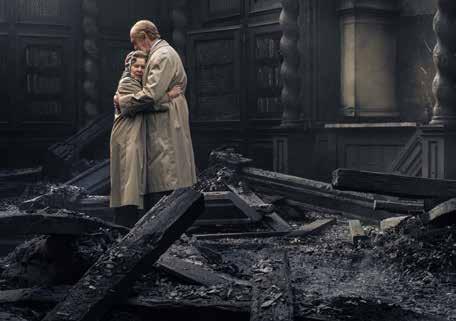
for several references. They need to know that it’s watertight enough that it can be defended. There are long, latenight discussions nightly when we are shooting.”
“If they flag it, it doesn’t go in,” says Mackie. “We’ve cut things at even the final mix. But we’ve always found a way to be able to have enough dramatic licence to be able to get a moment across.”
Those who watched the trailer for this series will have noted the “dis claimer” that will be played for the first time at the start of each episode: “Inspired by real events, this fictional dramatisation tells the story of Queen Elizabeth II and the political and per sonal events that shaped her reign.”
While this is seemingly in response to calls from Dame Judi Dench, among others – in a letter to The Times, she asked for a disclaimer at the start of the programme as a mark of respect for the Queen – the line is not a new
Pryce was initially reluctant to take on the role of Prince Philip, given the Duke’s huge public profile. “It wasn’t something I leapt at because I thought you’re on a hiding to nothing in a way with the public perception of Philip,” he says. “But, secretly, I wanted to be asked. I had a wonderful experience playing Pope Francis [in The Two Popes], but the older you get, the less interest ing the roles [you are offered] become. Rightly, women complain about it all the time.”
The new cast will continue with their roles in the sixth and final series, cur rently filming, which covers the latter part of the 1990s and the early 2000s, including Prince William meeting Kate Middleton at St Andrews. It’s a royal romance we know well, but seeing the drama played out in all its beautifully produced glory, is certain to be a com pelling draw for viewers. And, while much has changed in the monarchy and society since The Crown began in 2016, that won’t change anytime soon. n
Season 5 of The Crown is available on Netflix.
19 Television www.rts.org.uk November 2022
The Crown Netflix
ITV turns to the X factor
How refreshing it is to hear ITV being nega tive about its own online service, ITV Hub. Appar ently, it is clunky, looks dated, isn’t a destination, and there is nothing on it. All pretty much true, and expressed only a good chunk of a decade after all those things were clear to the UK consumer. Why this sudden honesty? The imminent launch of Hub’s replacement, of course: ITVX will debut on 8 December.
ITV’s traditional reluctance to embrace the digital space – the pro portion of its viewing undertaken online is about 4%, compared with 16% to 17%, reportedly, for the BBC and Channel 4 – is by design.
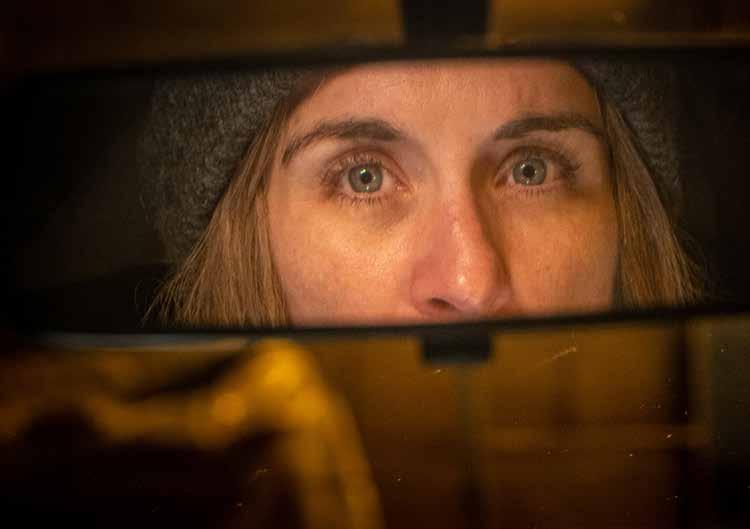
On a view-by-view basis, broadcast can still be better monetised than online, with any premiums that result from better targeting being outweighed by viewers having a much lower tolerance for ads, meaning reduced ad loads across programming.
TV consumption has continued on its inevitable path from broadcast to internet delivery, leading to an intensi fying scramble by media companies as
linear-TV viewing minutes are reallo cated online to different video suppli ers or to other activities.
Even so, ITV has been content to present a substandard product to the market to ensure less cannibalisation of its linear schedule. We estimate that, on average, only about a fifth of viewing lost from linear broadcasters as a whole has been retained by their online services. ITV will have done worse.
More on cannibalisation later, but make no mistake, ITVX is a step change for the company. There will be an extra £160m per year to spend on program ming plus 9,000 hours of catch-up con tent – way more than the 1,500 hours available until recently on ITV Hub.
And the new scripted windowing strategy prioritises ITVX: weekly pre mieres on the service will be exclusive
to ITVX for six to nine months before going to linear. This will include some of the broadcaster’s biggest dramas, such as Litvinenko, with David Tennant, A Spy Among Friends, starring Damian Lewis and Guy Pearce, and the thriller Without Sin, which stars Vicky McClure.
We will have to wait to see how long this aggressive windowing lasts: it is not clear how such a drastic change to the broadcaster’s release model in favour of online viewing will affect the linear-TV and, therefore, overall per formance of its programmes.
We can’t imagine that ITV is any more the wiser. While you might have assumed that the broadcaster would have been experimenting with how it releases programming, nothing of note has been held back from broadcast for a long period.
The closest examples – such as dropping the second series of The Bay on the Hub, together with later series of Marcella and Finding Alice – all coincided with the linear-TV release. These are too isolated to inform view ing trends when entire genres are held back from linear and non-ITVX catch-up platforms (currently 96% of
20
Claire Enders assesses how audiences and advertisers are likely to respond to the new streaming service ITVX
ITV ITVX show Without Sin
ITV viewing) for the best part of a year.
In recent times – until now – ITV’s major scheduling strategy has involved a great reliance on stripping pro grammes, with episodes being broad cast across consecutive nights. This provides the full benefit of linear reach and means that a complete boxset is available very soon after premiere.
Such pragmatism protected ITV’s still very profitable linear ad business: a consistent rationale that illustrates why the new content strategy for ITVX seems abrupt.
This is where cannibalisation comes into play. There is no doubt that the new windowing strategy will drive viewing to ITVX. We can be confident that ITV’s programming will, as usual, be very good.
In the past, we have quantified this by noting that ITV has had the best scripted series completion rates across the broadcasters. Major events, such as the forthcoming World Cup, will ensure that many people download the new app. It will not be possible to upgrade the existing ITV Hub app to ITVX.
The growth in the service is likely to come from ITV’s existing linear-TV audience, meaning that the same monetisation issues, relative to linear, become pertinent. Indeed, after flip-flopping on whether ITVX’s ad-loads would be above or below the Hub’s – and after Netflix announced its ad-tier would support only four to five minutes of ads per hour – ITV confirmed the load would be lower. Currently, the load range is between zero and seven minutes per hour on the Hub and between seven and 12 minutes per hour on linear.
Outwardly, cannibalisation isn’t in ITV’s narrative. It imagines ITVX and linear-TV generally will provide two discrete viewing groups. The theory is that such long delays between the releases of programming will allow two chances for shows to catch an audience.
Instead of cannibalisation, the com pany has told the market that ITVX’s growth will come from a particular sub-set of viewers. ITV has dubbed this group “mainstreamers” – people who watch a small amount of ITV content, with most of the rest of their TV appe tite satiated by on-demand services.
Even ignoring the hypercompetitive nature of online, the difficulty of ITV successfully attracting these viewers is obvious when you understand what they watch. The television ratings body Barb reveals that the ITV programmes
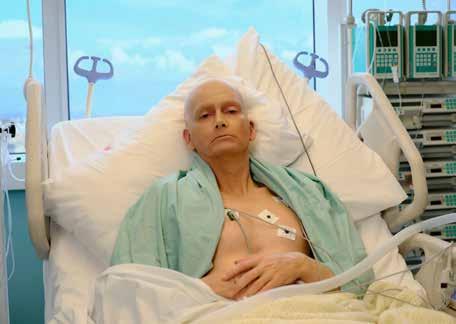
that over-perform for light-ITV and SVoD viewers are, unsurprisingly, all event television. Think of the Euros, I’m a Celebrity…Get Me Out of Here!, Love Island, the Brit Awards, international football and the Six Nations.
These are not things that ITV can just produce more of to drive up engage ment. Worse still, much of what these viewers watch on SVoD does not pres ent feasible commissioning options, because the shows are either too expensive or too edgy for a broadbased public service broadcaster. On the plus side, though, there will be more freedom for online-first commissions.
But probably even more telling is that none of the content that the light
Street, The Chase and The Larkins
It certainly appears to be the inten tion that ITVX exclusive programming will veer away from this sort of con tent. However, this type of drama, and formats such as The Chase, are the areas in which ITV is arguably world-leading, with a decades-long foundation on which to build. With ITVX, the broad caster may be attempting to commis sion content for which it does not have such a legacy.
How much has timing played into what ITV is saying ITVX is supposed to be and do? We should recall that the service was announced in the spring, just as the market dramatically reas sessed the potential of subscription
ITV viewers watch on ITV is leaving linear to become exclusive to ITVX or being given some sort of windowing prominence.
Furthermore, we would expect that, Love Island excepted, most viewing of these programmes by the ITVXtargeted demographics remains via linear, rather than online. As such, it is unlikely that many “mainstreamers” will ever to need to go on ITVX to continue accessing the ITV shows they clearly like.
If we look at the other end of the scale, those programmes that appeal less to light ITV viewers/SVoD users than they do to the average viewer are almost all scripted. SVoD users are least likely to watch ITV staples such as Midsomer Murders, Grantchester and Emmerdale. The bottom three of the top 100 programmes for the lightest 25% of ITV viewers are Coronation
streaming services and share prices plummeted.
On top of its free service, ITVX will have an ad-free subscription tier, which will hold the remains of BritBox, and other licensed content, but ITV doesn’t want to talk about that.
We don’t know what narrative would have been presented around ITVX had the SVoD market remained buoyant, but free, ad-supported video has become buzzy in the wake of the streaming maelstrom.
In the short-term, having a product that can be positioned in a buzzy seg ment is helpful with investors, but, beyond that, it is hardly going to affect actual consumer behaviour. We will wait and see how eager viewers are to embrace ITVX. n
21 Television www.rts.org.uk November 2022
Claire Enders is the founder of Enders Analysis.
ITVX show Litvinenko ITV
Trouble in paradise W
hite privilege, sexual identity and racial dynamics were among the themes served up alongside the infinity pools and swanky cocktails at an uber-luxurious Hawaiian hotel in the first season of Mike White’s lacerating satire, the Emmy-garlanded The White Lotus
In season 2, which began at the end of last month, the location switches to sun-soaked Sicily. Once again, we are in the company of a group of rich Americans holidaying in a luxury hotel and trying their hardest to make para dise work for them.
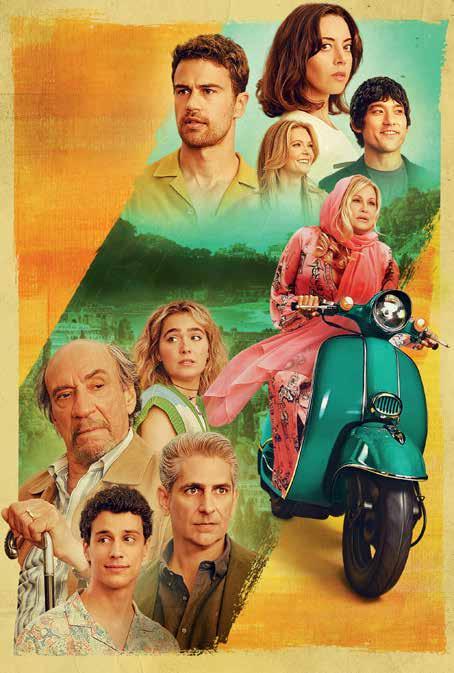
Their pursuit of the good things in life comes alarmingly unstuck, how ever, when one of the guests discovers several dead bodies floating in the Mediterranean. Cut to a week earlier, when the well-heeled holidaymakers arrive at the eponymous hotel.
The device will be familiar to those of us who were bowled over by the original series. It, too, started out with a dead body and then flipped back in time by seven days.
On the evidence of episode 1, sea son 2 of The White Lotus will focus far more sharply on the carnal appetites of its subjects than did its predecessor. But this being a show written by Mike White, don’t expect much in the way of real romance as the sex drives of his characters leave us feeling queasy. Without much fanfare, we are dropped into a storyline involving the local sex trade – and an 80-year-old man repeatedly hitting on women barely old enough to be his granddaughters is hardly Love Actually. Not for nothing has White been described as “an auteur of uneasiness”.
For a sequel, this latest instalment of The White Lotus is unusual in that it resurrects only one of the cast mem bers from the first series – Jennifer Coolidge, who gives an immaculate performance as Tanya, the needy, alco holic heiress with an eating disorder.
In its original incarnation, The White Lotus was a show that reminded us of television drama’s ability to disem bowel our troubled times and refash ion them for entertainment. Season one engaged with a range of sensitive topics that are very much part of the zeitgeist. All the more puzzling, then, that in the UK it has taken the show’s awards success for the series to finally
22
As The White Lotus returns for a second run, Steve Clarke analyses the unsettling TV satire that dominated this year’s Emmys
Sky The White Lotus
register on the radar of British TV viewers.
“It’s the show that every TV executive is talking about,” said one well-placed Brit in the industry recently. What took them so long? The sheer quantity of classy TV drama series shown in recent years is perhaps one explanation, and a fine example of TV’s intense battle for viewers. A second reason may be the fact that The White Lotus premiered in the UK on Sky Atlantic in mid-August 2021, just when many British media folk were taking their first holiday since the start of the pandemic.
In the US, The White Lotus, commis sioned by HBO, was a word-of-mouth hit prior to punching through at the Emmys in September: White won for writing and directing; Coolidge and Murray Bartlett scored in the acting categories; and the show itself carried away the Outstanding Limited Series award. Not a bad haul for a show that has been something of sleeper hit in the UK.
The White Lotus was itself a child of Covid. As the pandemic closed sets on both sides of the Atlantic, HBO approached White to see if he had any ideas that could be quickly turned into a show. HBO had one other stipulation – the programme would have to be filmed in a single location that could support a Covid bubble.
White, who learned his craft in writers rooms on shows such as the US high-school drama Dawson’s Creek, started work on the script at the end of the summer in 2020. Filming began in the high-end setting of the Four Sea sons Maui in Hawaii just two months later. Subsequently, he described the scripts as “basically first drafts”.
White has said that The White Lotus engages with the idea that, no matter where we are, even holidaying in a tropical paradise, there is no avoiding ourselves or our present predicament.
“That idea of being transported away really was the inspiration for the show as much as anything, and [it’s] why the music is the way it is,” he told Vulture website. “You go to these places, [on] this hunt for escapism, but there’s this feeling of existential dread that permeates the experience. The waters are rising here, too. There’s no getting away from it all. There’s no mystery any more.”
With his characters holed up in Hawaii in the sumptuous – and exqui sitely photogenic – hotel, White gave
us a scintillating critique of the upper reaches of American society that was both hilarious and deeply unsettling.
Season 2 promises more of the same; whether the characters turn out to be as fully realised as those who featured in the original show remains to be seen. Bartlett’s scene-stealing performance as the hotel manager, Armond, set the bar extraordinarily high. His botched attempts to placate his most demanding guest led to Fawlty Towers-style high camp (well, The White Lotus is set in a hotel) – and, in the final episode, one of the funniest scenes you are likely to see on TV this year.
To execute this kind of dysfunction successfully on screen, it probably
Jack Black, subsequently rebooted as a musical and TV show. White wrote and acted in the acclaimed Jennifer Aniston vehicle The Good Girl (2002). In 2011, he created the edgy HBO series Enlightened, which starred Laura Dern and laid down some of the tropes that were resurrected for The White Lotus, with the action veering from dark satire to pure comedy.
Remarkably, White wrote and directed every episode of The White Lotus, a feat he pulled off with both season 2 and Enlightened. No writers room collaboration and compromises here. Producers talk a lot about pro tecting the writer’s vision/voice in TV drama. Well, here it is, the real thing
helps to have experienced some of it personally. It therefore comes as no surprise to learn that White, now in his early fifties, is no stranger to mental illness. In 2004, after making a name for himself, he had a nervous break down while working on a TV show that was proving problematic.
He became a patient at a psychiatric hospital and the show was cancelled. “I felt weak and lost, like a screw-up, and, at the same time, coming out of it, I felt like I’d been given a huge gift,” he told The New York Times in 2011.
White was brought up in Pasadena, California, the son of a minister and ghostwriter for evangelical Christian leaders. When White was 11, his father came out as gay to his family, but remained in the closet to protect his job in the church until his children completed their education.
Among White’s early successes was the movie School of Rock (2003), starring
undiluted by second guessing what an audience or a commissioner really, really wants.
Finally, mention must be made of Cristobal Tapia de Veer’s outstanding and highly original score – memorably described by Vanity Fair as “foreboding waves of twitchy rhythms and tribal chants that seem to engulf the resort’s guests at regular intervals”. White said he wanted it to “feel like a tropical anxiety attack”.
Season 1 of The White Lotus is must-see television, a disturbing treat that speaks to our dark times and their preoccupa tions. Miss it at your peril.
Whether the second series can hit the high notes of the first remains to be seen, but the reviews so far have been ecstatic and I, for one, will be tuning in. n
Season 2 of The White Lotus launched on Sky Atlantic on 31 October.
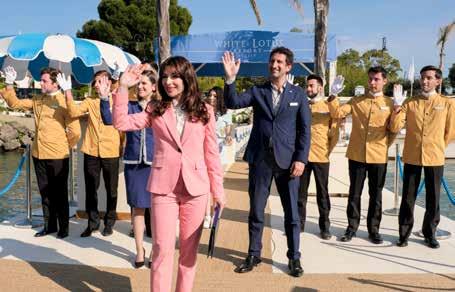
23 Television www.rts.org.uk November 2022
Sky
The White Lotus
TV goes social
The innovative ways in which producers, broadcasters and streamers are partnering with social media plat forms to attract new audiences and generate revenue was recently the subject of a lively RTS panel, “How broadcasters and plat forms are working together”.
Millions of people who may never have watched a full programme on TV are regularly engaging with the same shows online. They are turning to You Tube, Facebook, Instagram, Snapchat and TikTok to watch original content and reworked versions of TV material from series as diverse as Kitchen Night mares, Clarkson’s Farm and The Daily Show with Trevor Noah
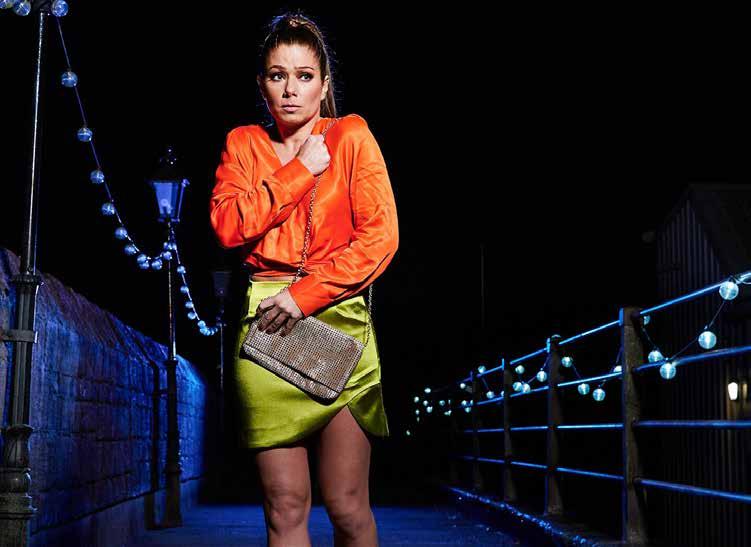
“Different platforms are good for different things,” said James Loveridge, director of entertainment at the UK’s Little Dot Studios, a specialist in digital video. “YouTube is good for legacy content that feeds into itself, TikTok for reaching younger audiences and reaching them quickly. Facebook is good for building fan communities.
You might have the same clip going out to all these platforms, but you have to use a different approach [for each one]. For example, [for] Snapchat you need to hook the user quickly, which informs how you present the content.”
For more than a decade, Little Dot has overseen social media partner ships for studios, streamers and pro ducers, including NBCUniversal, Netflix, Amazon Prime, Sony Pictures TV and Discovery Channel.
“There are two core languages you need to be able to speak when you’re looking at platforms: the language of the algorithms and the language of the audience,” Loveridge explained.
Social media platforms can offer broadcasters and streamers marketing,
commercial and creative initiatives. Neil Price, strategic partner manager for UK partnerships at YouTube, said: “We have 10 different ways in which a creator or partner can monetise, not all relevant to media companies, but we do our best to make sure they are aware of them all and are able to take advantage of them.” He continued: “The two pillars that tend to be the focus of our conversations [with broad casters and streamers] are commercial and creative.”
For example, the BBC uploads high lights and individual dances from Strictly Come Dancing to a bespoke BBC Strictly Come Dancing YouTube channel the night after the show is broadcast on BBC One. There, it reaches a differ ent and younger audience to those who tune in on TV.
“In addition, [this YouTube audience is] coming across [further] BBC Studios output,” said Price. As the BBC’s com mercial arm, BBC Studios aims to dis tribute its top brands, including Strictly and Top Gear, on as wide a range of social platforms as possible. Revenue is generated by what is known as
24
The RTS learns how broadcasters have turned to social media in search of new audiences and revenues
Channel 4 Hollyoaks
social monetisation – advertising around the content, branded enter tainment and sponsorship.
Matt Risley, Managing Director of Channel 4’s in-house digital agency, 4Studio (Digital Content), which launched in 2020, revealed that the broadcaster did not make any money from social before 4Studio was created. That, however, has all changed: “Last year, we made £14.5m [from social media platform partnerships],” said Risley, a former Channel 4, MTV and Sky UK executive. “There are opportu nities there if you know how to collab orate with partners, and how to come up with multifaceted strategies.”
Extended versions and short-form editions of linear shows, such as Chan nel 4’s Hollyoaks, are popular. 4Studios made Hollyoaks: IRL for social platforms in summer 2021. This series of short films explored real-life stories reflecting some of the themes covered by the soap, including young people’s mental health.
“It was a way of trying to create con tent that was not bound by the [needs of] conformity and character fit or a certain length or schedule slot,” said Risley. “It deepened the fan experience.”
He also highlighted the E4 series Tattoo Fixers, about a pop-up tattoo parlour that turns bad ink into works of art. “We found a way to bring that to a new, younger audience on Snapchat,” said Risley. The show, which is no longer on E4, has been reformatted for Snapchat as short, “vertical-format stories”.
According to Lucy Luke, head of UK partnerships at its owner, Snap Inc, Snapchat reaches 90% of 13- to 17-yearolds in the UK. Tattoo Fixers is perfect for this audience. “In that show, we saw before-and-after transformational content,” she said. “[4Studios] edited it amazingly. It gets straight to the point, straight to the action and everyone knows a transformation is going to happen. They want to watch the rest of the episode on Snapchat to see the how, the who, the what, the where, the when.”
Luke joined Snap in January 2022, tasked with managing content partners and leading Snapchat’s content strat egy in the UK. Snapchat streams shortform, made-for-mobile video content across news, sport and entertainment. The main difference between Snap chat and YouTube or Meta is that it curates the content, said Luke. It recently teamed up with ITV for World of Love Island, which repurposes clips from Love Island
“A lot of Snapchat-ers in our com munity were telling us they were catching up on Love Island exclusively on Snapchat,” Luke said.
ITV also has YouTube distribution for a World of Love Island channel, adding to its portfolio of ITV-branded YouTube channels. Two of the most popular are for Good Morning Britain and This Morning, the latter presented by Holly Willoughby and Phillip Schofield.
The recent closure of the original content divisions of both Snap and YouTube has given broadcasters – and production companies such as Little Dot – more opportunity to create con tent for the social platforms.
Now, 4Studios is working with You Tuber, content creator and entrepre neur Alhan Gençay on a digital original, It’s Alright to be White. The fivepart series sees Gençay travel the UK
“The younger sister of a friend of mine was asked who her favourite YouTube creators were and she said, ‘Holly and Phil’,” said YouTube’s Price. “Over time, broadcasters [have] real ised that a big part of what happens on YouTube is that audiences start to find identities and niches.”
Little Dot’s Loveridge agreed that broadcasters now understand what social media can do. He pointed to the social content Little Dot created recently for Channel 4’s Kitchen Night mares, whose last series aired in 2014. “It’s very fan-focused,” he said of the Gordon Ramsay-fronted show, which has taken on an online life of its own. “There’s a lot of humour, a lot of Gen Z and millennial kind of jokes and memes. We’ve had live streams that are just a microwave going for about three hours, dubbed Chef Mike.”
Loveridge also noted accidental successes: “We had a live stream for a documentary about beekeeping on Discovery. But it just looped about three seconds of bees. Loads of people asked, ‘What are they telling us?’ The viewing went through the roof.”
to discover “white tribes” of people who are very different from himself.
Quizzed by experienced media com mentator and journalist Kate Bulkley, the panellists – all wearing trainers and with not a suit and tie in sight – chewed over future prospects. YouTube recently unveiled plans for next year to start monetising YouTube’s short feed – clips lasting less than 60 seconds – on the platform with ads.
Luke said she was talking to clients a great deal about augmented reality (AR). “A lot of my role is supporting broadcasters and thinking about what the extra things are that they can do to engage with their community through a different lens.”
In an AR iteration, Phil and Holly could soon be sitting on your sofa. Sort of. n
Report by Stuart Kemp. The RTS national event ‘Social media platform session: How broadcasters and platforms are working together’ was held on 26 October at the Cavendish Conference Centre in London. The producers were Kate Bulkley, Julie McKeen and David Amodio.
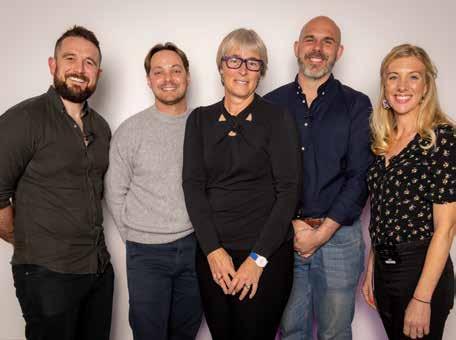
25 Television www.rts.org.uk November 2022
Paul Hampartsoumian
From left: James Loveridge, Neil Price, Kate Bulkley, Matt Risley and Lucy Luke
ScreenSkills, in partner ship with RTS Scotland, held an unscripted television networking event last month, the first of a series of themed nights open to anyone trying to break into the film and TV industry.
The three-hour speed networking evening, “The big connection”, saw guests being allocated a table and visited by professionals at eight-minute intervals, with everyone given the opportu nity to introduce themselves and ask questions.
Sarah Joyce, head of unscripted at ScreenSkills, explained the choice of the evening’s theme: “Some times, people don’t really understand what unscripted TV is, or… appreciate that there’s such a breadth of content.
“It’s kind of misunderstood and overshadowed by drama, which is a lot showier and has bigger budgets, so it’s nice to raise a bit of awareness and for people to realise that there is a career path here.”
Discussing the health of the unscripted industry in Glasgow, Laura MacKay, pro duction talent manager at IWC
‘Huge’ boom in unscripted
Media, which makes Susan Calman’s Grand Day Out, said: “It’s huge, absolutely huge. A lot of the big London pro duction companies have opened offices here.” That, she said, meant they were reaping the benefits of the

national and regional quotas.
“A lot of that is quiz shows and shiny entertainment,” she said, “but the bread and butter in Glasgow is unscripted.”
Asked about the demand for employees, MacKay said:
Centre visits new BBC/S4C HQ
Rhys Bevan, head of content operations at S4C, described the nearly seven-year journey undertaken by the BBC and S4C in Wales to establish a new HQ in Cardiff: “From laptops to playout, this building repre sents our move from linear broadcasting to IP-based multiplatform delivery.”
During an RTS Cymru Wales tour last month, Bevan
and Roger Crothers, head of technology at BBC Cymru Wales, said the £120m Cen tral Square building was conceived as a fully inte grated IP operation, which will be the largest digital broadcast centre of its kind in Europe when complete.
The centre opened for business in October 2019 and now handles transmission for both broadcasters. Bevan explained that, as part of the
move, S4C’s former transmis sion centre in Llanishen, north Cardiff, “was taken over by BBC colleagues for six months before the move so that they could develop a full understanding of what running S4C was like”.
Crothers emphasised the BBC’s vision of an accessible public space, with technical facilities for “all spaces in and outside the building to be used for live broadcasting”.
“The industry is thriving right now in Glasgow. There is more work than people.”
Film and TV graduate Abby Hinkley spoke at the event about her experience: “The biggest thing I learned was to not be afraid when reaching out. A lot of people said, email me and we can go for a coffee and a chat, which is just priceless [advice]. It’s such a small and simple gesture but it means everything to someone like me who is just starting out in the industry.”
She continued: “I never knew how many production companies there were in Glasgow – around 70, I understand – which is essential information for people like myself.”
Kate Efomi, ScreenSkills representative for Scotland, spoke about the objectives of the event: “If one person gained employment as a result of tonight that would make it a success, although I suspect a lot more will come of this.”
RTS scholar and student committee member Colin MacRae devised the speed networking format for the event at BBC Scotland studios. Beth Watt
The current services hosted at the site include BBC One Wales, BBC Two Wales and S4C, along with Radio Wales, Radio Cymru, iPlayer and S4C’s ondemand service, Clic. Many network programmes are also broadcast from the cen tre, including some editions of Newsnight
The tour took in the new TV studios with their virtual sets and robotic cameras, which can quickly be recon figured to accommodate both BBC Wales Today and S4C’s Newyddion Hywel Wiliam
26
RTS NEWS
Channel 5
Susan Calman’s Grand Day Out
RTS Cymru Wales
RTS Scotland
BBC Scotland’s Guilt won the Drama prize at the RTS Scotland Tele vision Awards late last month, the second time the critically lauded Edinburgh crime thriller, written and created by Neil Forsyth, has taken home this award.
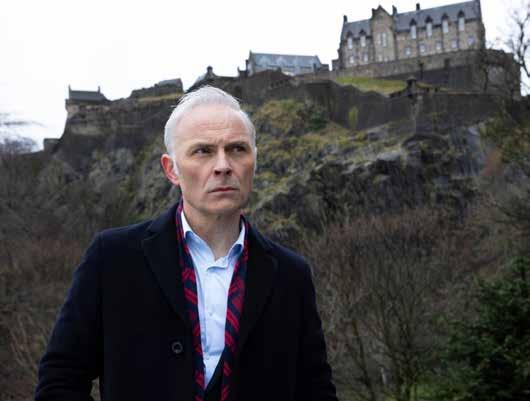
Darren McGarvey’s Class Wars, made by Tern Televi sion for BBC Scotland, won the Documentary and Spe cialist Factual award, with McGarvey also being named On-screen Personality.
In the news and current affairs categories, STV News at Six took the News Programme prize and the Young Journal ist award went to BBC Scot land’s Katie McEvinney. The Panorama report I Can’t Breathe: Black and Dead in Custody secured the Current Affairs award for BBC Scotland.
Firecrest Films’ true-crime documentary for BBC Scot land, The Hunt for Bible John, about the murder of three young women in 1960s Glasgow, picked up two prizes: Director for Matt Pinder and Editing for Audrey McColligan.
Pinder also won the Director award last year for Firecrest’s BBC documentary
RTS Scotland Television
Awards winners
Outstanding Contribution Award
Jim Hunter
Drama•Guilt Expectation and Happy Tramp for BBC Scotland and BBC Two
Director•Matt Pinder, The Hunt for Bible John•Firecrest Films for BBC Scotland
Writer•Stef Smith, Float•Black Camel Pictures for BBC Scotland
On-screen Personality• Darren McGarvey
Comedy•How We Forgot to Save the Planet•BBC Studios for Channel 4 Entertainment and Features
Extraordinary Escapes with Sandi Toksvig•Tuesday’s Child Scotland for Channel 4
Documentary and Specialist Factual• Darren McGarvey’s Class Wars•Tern Television Productions for BBC Scotland
Guilt repeats triumph
Murder Trial: The Disappearance of Margaret Fleming Glasgow visual effects house Revenant won two awards for its work on the immersive space film Life Beyond Earth: Animation and VFX, and Post-production – Graphics and Titles.
Jim Hunter received the Outstanding Achievement award in recognition of his work in studio and outside
Documentary and Specialist Factual – Arts Cèol is Cràdh Sgeul Media for BBC Alba
Documentary and Specialist Factual –History Mark Walters: In the Footsteps of Andrew Watson• 14th Floor Produc tions for BBC Scotland
Documentary and Specialist Factual –Science and Natural History Dolly: The Sheep that Changed the World Tern Television Productions for BBC Scotland News STV News at Six (Central) STV Young Journalist•Katie McEvinney, BBC Scotland
Current Affairs•I Can’t Breathe: Black and Dead in Custody•BBC Scotland for BBC One
Live Event•Na Trads 2021•Beezr Studios for BBC Alba
Daytime Antiques Road Trip STV Studios for BBC One Sport Undisputed: The Life and
broadcast sound. He has supervised sound on many shows, including The Weakest Link and The Royal Edinburgh Military Tattoo Hunter has mentored junior colleagues and spent years promoting sound edu cation in colleges and uni versities across Scotland.
There were three winners for Gaelic language channel
BBC Alba: Cum Suil Orm,
Times of Ken Buchanan•TVI Vision for BBC Scotland
Children’s•Cum Suil Orm•Corran Media for BBC Alba
Short Form•Everyman•Bombito Productions for Scottish Documentary Institute
Animation and VFX•Life Beyond Earth•Revenant Camera•Julian Schwanitz, Killing Escobar•Two Rivers Media for BBC Scotland Post-production – Editing•Audrey McColligan, The Hunt for Bible John• Firecrest Films for BBC Scotland Post-production – Graphics and Titles•Life Beyond Earth•Revenant Sound•Kahl Henderson, Iain Anderson, Sam Biggs and Stuart Bruce, Vigil• World Productions for BBC One Student Television Award•Colleen Bell, The Space I Occupy STV Player
made by Corran Media, in the Children’s category; Cèol is Cràdh (Sgeul Media) in the Documentary and Specialist Factual: Arts category; and Na Trads 2021 (Beezr Studios).
TV and radio presenters Des Clarke and Shereen Cutkelvin, and past winner of RuPaul’s Drag Race UK Lawrence Chaney hosted the awards at Glasgow’s Fruit market. Clarke said: “TV has kept so many people going over the past couple of years and it was fantastic to see so much of the talent we have here in Scotland enjoy a cracking night.”
Stephen O’Donnell, RTS Scotland Chair, added: “TV continues to inform, enter tain and inspire millions of people every single day and it was marvellous to welcome everyone back in person to recognise the great work that hit screens in 2021.”
The awards were spon sored by Channel 4, Screen Skills, Screen Scotland and The Nerve.
Matthew Bell
27 Television www.rts.org.uk November 2022
BBC Scotland drama Guilt, starring Mark Bonnar
BBC
RTS Scotland
In a TV landscape in which demand for new drama outstrips supply, adapting popular shows from abroad is a favoured strategy. It can often be done quickly and cheaply, and can deliver healthy ratings.
The original Swedish version of Before We Die per formed respectably when it aired in the UK, averaging 300,000 viewers across its first series on All 4’s foreign language VoD service, Walter Presents.
Writer Matt Baker recalled these figures at an RTS Lon don event last month. He went on to note that the audi ence for his English-language adaptation of the show on Channel 4, starring Lesley Sharp, topped 4 million.
Fellow panellist Sumi Con nock, creative director for TV formats at BBC Studios, where she distributes 300-plus titles around the world, identified why adaptations can be so lucrative: “Speed, cost, [and] you can make it more relat able for the audience if it’s set in your own country.
“People want to watch their own stars…. If you can reimag ine it and bring a big name to it, then that’s going to drive audiences to your platform.”
She added that proven success elsewhere reassures broadcasters that want “to feel they’re reducing their risk when they’re putting a lot of money on the table”.
Baker agreed: “The truth is, with certain types of drama, and I’m thinking particularly of crime procedurals, the development process is just much quicker – you’ve got the framework, the outline of the story.
“You are starting from sev eral rungs up the ladder if you’ve got a usable structure in place, which you can tweak and develop and adapt rather than… staring at a blank sheet of paper.”
Baker worked in corporate communications, most
ITV’s Professor T, starring Ben Miller
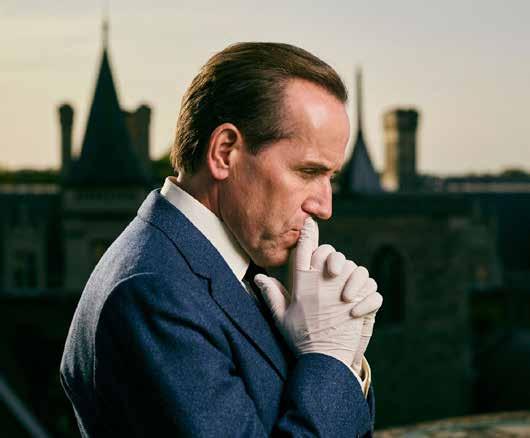
Found in translation
notably for Channel 4 and Viacom, before taking up the pen. “I’m one of these lock down pandemic stories. I used [it] to… do what I’d always wanted, which is to write professionally,” he revealed.
He made his debut on ITV’s remake of the Belgian crime series Profes sor T, then moved on to Before We Die, and has sub sequently created an original drama, the BritBox series Hotel Portofino
Is there a secret to a suc cessful adaptation? “A uni versal theme or story is
pretty crucial,” said Connock. “I think an adaptation is all about staying true to the core DNA of the story.
But, she added, “localisa tion” is needed to “make [a drama] feel culturally rel evant to, and connect with, the audience”.
As an example, she offered Doctor Foster, Mike Bartlett’s BBC One drama about infidel ity, an obviously universal theme, starring Suranne Jones and Bertie Carvel. The show has been remade in 10 territories, albeit in differ ent forms – in the Philippines,
the two BBC series were transformed into a daily soap, The Broken Marriage Vow, which ran for 107 20-minute episodes.
Singapore-based Sabrina Duguet, EVP for Asia-Pacific at All3Media International, emphasised that the demand for drama “is higher than the supply in a lot of countries”.
She has sold the format of ITV drama Liar, which starred Joanne Froggatt as a teacher who has been raped, around the world, notching up 11 adaptations so far, including in Italy, Spain, Germany, Malaysia and India.
Duguet added that an adap tation “needs to add some thing to the story”, framing the key question as: “Why would
28
NEWS
RTS
FEATURE
ITV
Matthew Bell discovers how hit drama series are being successfully adapted for new markets around the world
RTS London
‘STAY TRUE TO THE CORE DNA OF THE STORY’
an audience want to watch a local version more than the international version?”
Marianne Furevold-Boland, now the head of drama at Norwegian public broadcaster NRK, produced the real-time teen drama Skam (Shame), a huge hit in Norway that addressed sensitive issues such as sexual abuse. It has been adapted eight times internationally, including in the US as SKAM Austin, where it is broadcast on VoD service Facebook Watch.
She said it was “over whelming how it has been embraced by the whole world. I think it’s because it has a core storyline that reso nates with us all… regardless of borders and culture. It shows us that we human beings are much more alike than we might think.”
It is widely accepted in TV circles that reboots of sitcoms don’t work as well as those of drama series. For every success in the US such as The Office, there are many failures – Gavin & Stacey, Absolutely Fabulous, The Inbetweeners and The Vicar of Dibley – in which quirky/puerile (delete accord ing to taste), defiantly British humour has died on its feet.
“Normally, it’s hard for
comedy formats to travel, but we’ve done three big US adaptations,” said Connock: Call Me Kat (Miranda in the UK) and Welcome to Flatch (This Country) for Fox, and Ghosts for CBS.
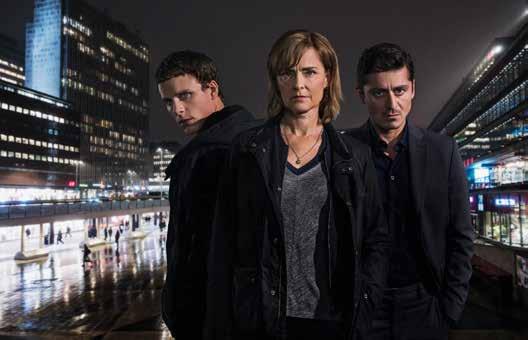
With comedy, she contin ued, there is “a delicate pro cess between sticking with the original and allowing the show runners room to manoeuvre”. Ghosts retains some of its original British roles, but adds US-specific characters, said Connock, including “a prohibition-era jazz singer and a disgraced Wall Street trader”.
And, of course, the US does comedy at volume. The sea son of Ghosts in the US runs to 18 episodes, as opposed to six in the UK. The Office, which ran to 14 episodes in the Ricky Gervais original, was expanded to 201 in the US.
Baker identified the combi nation of “a weird mix of confidence and humility” as the key attributes for an adapter.
“You have to have the confidence that you know the local audience better than the original creators… do. That’s why you’ve been hired and that’s what gives you licence
to change and adapt the material,” he said.
“You also need humility – you need to know when something works and it can’t be improved. At the end of the day, adaptations are the same as original dramas – they depend on the same elements: storyline, charac ter, jeopardy, surprise, psy chological credibility, relatability. So, you’ve got to retain what works.”
Baker namechecked two successful adaptations, Homeland and Ugly Betty, “which prove, when you get it right, you can have a huge hit on your hands”.
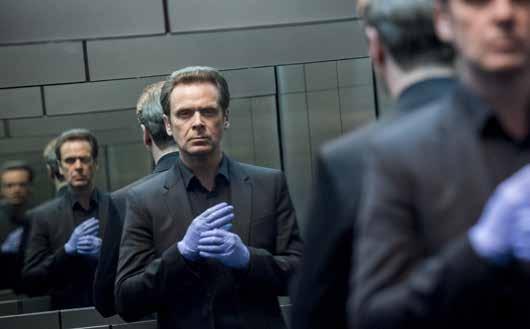
He thinks of an adaptation “as a cover version of a hit song – there’s no point in covering a song if you’re just going to pretty much repeat the interpretation and sound of the original. It has to work in its own right – if it’s a mish-mash of multiple people’s creative visions, it’s more than likely… to fall between two stools.” n
The online RTS London event, ‘Lost in translation? Adaptations across borders’, was held on 26 October, chaired by Andrea Esser, professor of media and globalisation, King’s College London and produced by Damien Ashton-Wellman. Video at: https://bit.ly/its-translation
29 Television www.rts.org.uk November 2022 Eén
The original Belgian Professor T
Channel 4
The original Swedish Before We Die
In October, RTS London and the Institution of Engineering and Tech nology (IET) picked out the key trends on show at this year’s IBC broadcast technol ogy exhibition and confer ence, held in Amsterdam.
The first in-person IBC since before Covid demon strated two big themes. First, the industry’s post-pandemic recovery was threatened by the worldwide cost-of-living and energy crises. Second, Covid had accelerated the adoption of Cloud-based working practices such as remote production – with perhaps five years of techni cal advances squeezed into two years.
The panellists were: Meh boob Siddiqui, client partner at NTT Data UK; Russell Traf ford-Jones, Chair of the IET Media Technical Network; Muki Kulhan, innovation co-lead for the IBC Accelera tor programme; Jonathan Chappell-Seetayah, IP broad cast engineer at Timeline TV and RTS Young Technologist of the Year 2022; and Neal Romanek, editor in chief of Feed magazine.
Siddiqui said the pan demic had exposed weak nesses in the media industry, and efforts to tackle these had so far concentrated on cost-cutting and the push to
IBC reveals TV in the Cloud

enable more Cloud-based and remote working.
He predicted that the expanding 5G networks’ combination of low latency (or signal delays) and high bandwidth would accelerate television’s use of the Cloud. However, less than 10% of global broadcast infrastruc ture and workflow world wide has so far made the transition to the Cloud.
At IBC, Siddiqui had been impressed by a new acronym: TAAS –TV as a service. “You can now rent the software and hardware to be a TV operator,” he explained. “You can hire the [distribution centre to make] a TV channel available on various set-top boxes.… This could have a future for linear-TV as well.”
He noted that, while streaming services had
Stunning locations can boost East
The state of the screen industry in the East of England took centre stage at a relaxed, but thought-provoking panel discussion and networking session hosted by RTS East and Pact, the independent producers’ trade body, in Norwich last month.
A panel from Norfolk Screen, RTS East and Tin Can Post, a Norwich-based postproduction house, discussed
how best to attract invest ment into the region, how to support local film and television students and how to encourage homegrown talent to stay on the patch.
Led by Jules Robinson, Pact nations and regions business development con sultant, the panellists talked enthusiastically about the region’s strengths, particu larly its diverse and beautiful filming locations. But in
addition to the stunning coastlines, seaside towns and wide skies of the Fens, the panel highlighted the broad range of education providers and screen-related businesses based in the East. These included leaders in new technology, innovative gam ing companies and postproduction houses.
Barriers, however, included a lack of significant studio facilities in East Anglia and
grown strongly during the pandemic, operators were now scrambling to expand FAST channels (short for free and ad-supported television) as consumers cut their spending on subscriptions.
Fellow panellist Russell concentrated on develop ments in sound technology: “Audio is lagging a little behind video (and that is not a lipsync gag) – there seem to be inherent problems with mixing audio in the Cloud.”
IBC
RTS Young Technologist of the Year Chappell-Seetayah looked at the future of linearTV and predicted that it would eventually sit within the streaming platform. “It won’t fully die out because there are some events we all want to watch together.
“Streaming platforms will no longer provide just sup plementary content to the main broadcasting environ ment – they will do all of that plus live events and use machine learning to provide content that we like. Big improvements in ease of use will be needed for linear-TV to sit comfortably within streaming. It will require a mindshift from broadcasters.”
The RTS/IET event was hosted by journalist Nadine Dereza and produced by digi tal consultant Terry Marsh. Gordon Jamieson
a need for more investment, but discussion with the audi ence led to positive conver sations about how to develop a screen cluster in Norfolk.
More than 40 people attended the event, held at Norwich’s Cinema City.
RTS East and Pact plan to hold another networking session in Cambridge this year, in response to local demand for more in-person events that allow students and professionals to make connections and to grow the industry in the region.
Rachel Watson
30 RTS NEWS
RTS East
IBC, in person
RTS London
Having spent two years meeting via screens, TV’s next generation proved there is no substitute for the real thing as more than 90 people gath ered at RTS Futures’ first in-person networking event since before the lockdowns.
The sold-out evening at the 7 Dials Club in Soho in midOctober saw 12 talent manag ers from some of the best production companies and recruitment agencies in the industry offer their expertise on how to break into TV.
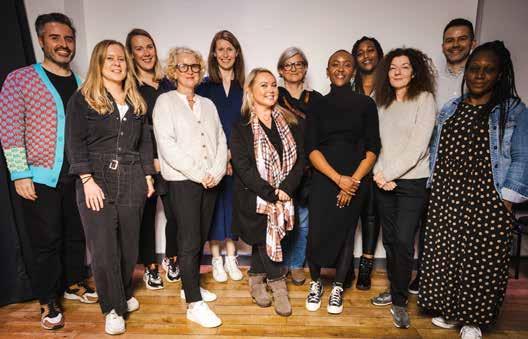
“We’ve done a lot of these events on Zoom, so it’s really, really nice to have everybody in one room,” said Lauren Evans, senior talent manager at Lifted Entertainment.
Companies represented included: Shine TV, which makes the popular factual series MasterChef and Hunted; Lifted Entertainment, which produces ITV entertainment hits Love Island and I’m a Celebrity…; and ThinkBigger!, which offers training in the creative industries.
The talent managers, who work across a range of genres, from entertainment to sport and specialist factual,
Talent execs offer tips
offered advice on everything from how to impress in interviews to navigating the world of freelance working.
Recruitment specialist Tors Sorby, of Talented People, spoke about the importance of communication when forging a freelance career in TV. “You’re like a little busi ness now as a freelancer, so promote your business. Reply
to emails, reply to phonecalls. Pick up that unknown num ber calling because that could be a job,” she said.
Also in attendance was production executive Adam Barber, of Air TV, the York shire-based indie respon sible for factual shows such as Helicopter ER on Discov ery’s Really channel. For entry-level interviewees,
How to survive five years in TV
Earlier last month, an online Futures event heard from four young people who have nav igated their first five years – a make or break time for many – in TV production.
Breaking into the industry is tough. Funmi Olutoye, a news features producer at ITV’s Good Morning Britain, reck oned that only one in 20 to 25 emails she sent out looking for work elicited a reply, let alone an interview. ‘It’s a test of your mettle and whether you’re tenacious enough to [work] in this industry,’ she said. ‘There
are many people I started with who are no longer here… it’s not because I’m more talented, it’s that I had more tenacity to stick with it.’
To prepare a presentation at work about his career recently, Michael Sheridan, an assistant producer at 4Studio, Chan nel 4’s social media depart ment, looked back at the emails he had sent looking for work experience and jobs – they numbered 916.
He said that to build a career in TV: ‘It’s really impor tant to be professional, but also bring… your whole self [to
work].’ He said everyone had their own experiences, were from different backgrounds and had different perspectives that were really interesting.
Developing a network is key given the freelance nature of much of the TV industry. ‘Keep in touch with people,’ said Fozia Nasir, a factual producer who is currently working on BBC Studios programme The Met: Policing London. ‘This is a very transient industry and people move around very quickly.’
She added: ‘At least six weeks before you finish a job, email talent managers and
Barber’s advice was simple: “Please come in and tell us you’ve watched our shows, not that you’re a film-maker and love dramas on Netflix.”
Julia Dodd, head of talent at Shine TV, added: “You don’t really need huge qualifications; you just need enthusiasm and passion… get stuck in and get on with it.”
Caitlin Danaher
start putting yourself out there.’
TV can be a demanding business. Jordaan Shelley, another news features pro ducer at Good Morning Britain, said: ‘There are lots of moving parts, particularly if you are in live TV… things change and the story moves on, so [your edi tor] wants you to scrap what you’ve done and change it all. That was one of the biggest things that I had to get used to and it was stressful.’
The event was hosted and produced by the broadcaster Jasmine Dotiwala, and the four panellists were former trainees of hers. ‘First five years in TV masterclass’ can be watched at: https://bit.ly/RTS-five Matthew Bell
31 Television www.rts.org.uk November 2022
Paul Hampartsoumian
The 12 experts who led the RTS Futures networking event
Futures RTS Futures
RTS
Shiers Trust
Sebastian Cody is to receive the Shiers Trust Award 2022 for a book bringing together the writings of TV producer and historian Jerry Kuehl.
The American-born Kuehl, who died in 2018, founded the production company Open Media with Cody. Along with many documentaries and entertainment shows, Open Media made the latenight, live discussion show After Dark, which aired first on Channel 4 and then on the BBC.
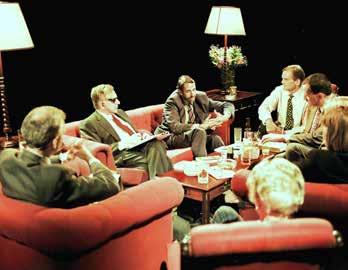
Kuehl had joined the BBC in 1963 as a historical adviser on the documentary series The Great War, later working on ITV’s landmark Second World War documentary, The World at War
The book will draw from 50 years of Kuehl’s writing on TV history and archives, some of it previously unpublished. “Authoritative and accessible (as well as funny), his writing centres around history on screen,” explained Cody.
“In our current era of unreal ‘reality TV’ and drama-documentaries like
New Thames Valley Chair
Jennie Marwick-Evans, an RTS member since working at Quantel, 35 years ago, is the new Chair of specialist tech nology centre Thames Valley.
She said: “Thames Valley is going to be more of a technol ogy centre for the whole of the RTS, working to assist and co-host with other centres, as well as having an exciting calendar of events ourselves.
“The world of media enter tainment is changing fast – and keeping up with it can be overwhelming. The RTS has an incredible opportunity to be part of that journey.”
After Dark
‘Moral force’ to be remembered
The Crown, his thoughtful and witty unpacking of the cen tral issues makes this book of great contemporary relevance to debates around truth, trust and accuracy.
“As well as being a plea sure for the general reader,
The Society has announced 45 new undergraduate bursa ries, a record high for the scheme that began in 2014. To date, the RTS has invested more than £1m to suport almost 300 bursaries.
The 2022 intake includes eight students who receive a new RTS Digital Innovation Bursary, in addition to those studying TV production and broadcast journalism. STV continues to back the scheme by providing 10 of the bursa ries, with a further two sup ported by the Steve Hewlett Memorial Fund, started in honour of the late journalist.
New for this intake of scholars, is the Beryl Vertue Scholarship, supported by Hartswood Films. Vertue, who died earlier this year,
the book will also be a valu able resource for academics.”
Cody met Kuehl in 1980 at the National Film and Televi sion School, where Kuehl was head of general studies. “We started a conversation then which never really stopped.
Channel 4
Joining me later in starting a production company in the heady days of the young Channel 4, we ended up talk ing for nearly 40 years and it is really hard not to be able to talk to him now,” said Cody.
“Jerry was such a funny and an apparently easygoing man, but also so severe and uncompromising when confronting bogus people or bad ideas. He was our inhouse historian, our humour ist and our moral force.”
The award – £3,000 now and £2,000 when the book comes out – will assist with the book’s research, editing and publication. It is to be co-edited by cultural and TV historian Mary Irwin, honor ary fellow at Queen Margaret University in Edinburgh. Irwin had interviewed Kuehl for her PhD, BBC Television Documen tary 1960-1970: A History
The Shiers Trust Award, which is funded by a bequest from the US television histo rian and RTS member George Shiers, offers a grant of £5,000 towards publishing any aspect of TV history.
Matthew Bell
RTS bursaries hit an all-time high
founded the indie, which made the hugely popular Men Behaving Badly and Sherlock
One television production scholar will be chosen each year by Beryl’s daughters, Sue and Debbie Vertue, from among the top-scoring appli cants for an RTS bursary. “Beryl was a huge advocate for supporting the next gen eration of television produc tion talent, so it’s a fitting tribute to be awarding a bur sary in her name,” they said.
The bursary schemes sup port young people from lower-income backgrounds
wanting to work in the tele vision industry.
Scholars receive £1,000 a year to assist with their expenses and living costs, as well as free RTS membership during their studies and for a year following graduation. In their final year of study, the RTS aims to provide mentor ing opportunities. The Steve Hewlett and Beryl Vertue scholars receive £2,000 a year.
More than 80% of gradu ates from the first five years of the scheme are working in TV or related industries.
Matthew Bell
32
RTS NEWS
RTS Bursaries
Thames Valley
Two young TV workers discussed their route into the industry at an October webinar, “First steps into production”.
Ethan Blake Brooks, a shooting assistant producer at a Bristol indie, revealed his love of factual TV at the RTS North West event, which was chaired by Laurie Kirkham, head of development at Leopard Pictures.
“You never quite know what you’re going to get,” said Brooks. “It’s a privilege to experience [different] com munities and people.
“I’ve done documentaries on the Deaf community, which, for me as a deaf indi vidual who hasn’t come from a Deaf cultural background, was a massive privilege….
“Last year, I was filming [BBC One’s] Trawlermen: Hunt ing the Catch… and looking at the extreme highs and lows of a fishing community.”
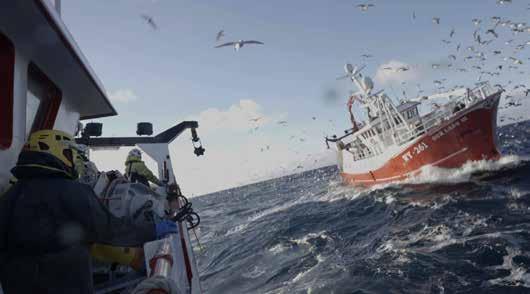
Ruth Bader, a producer at Leeds-based Screen house Productions, is work ing on short films for the BBC’s The One Show She said: “I’d absolutely
TV’s tricky first steps
agree with Ethan – it is an extraordinary privilege of our job that we get to meet so many different people who you would never get the chance to be in a room with. We made a film with Benny from Abba this year.”
Brooks studied documen tary film at university, where he won an RTS Cymru Wales Student Award for the factual film Mathew vs Pritchard,
before being accepted on to Channel 4’s production trainee scheme. He said that winning the award had given him confidence in himself.
In contrast, Bader did an English Literature degree and worked widely before landing her first TV job. She advised: “Do not miss out your normal jobs [in an application]; they show you are capable – and that’s really, really important.”
The UPSIDE
Three birthdays come along at once
The BBC, Channel 4 and S4C have all been celebrating recently. Famously, the BBC’s inaugural news bulletin, read by director of programmes Arthur Burrows 100 years ago, was read twice, first fast and then slowly to enable listeners to take notes.
Perfect for a Harry Enfield and Paul Whitehouse period parody. If you missed their take on Auntie’s centenary, BBC Two’s The Love Box in Your
Living Room, do catch it on the iPlayer. It’s laugh out loud.
And it was good to see Tim Davie dropping into Chan nel 4’s 40th anniversary dinner, held at the V&A, where attendees were treated to cabinet minister Thérèse Coffey leading sev eral choruses of happy birth day. Surreal but true.
Music, magic and mayhem with Jools
It is also the 30th birthday of the world’s most eclectic music show, Later… with Jools Holland
First, we had the book –Mark Cooper’s erudite Later… with Jools Holland, 30 years of Music, Magic and Mayhem was published in September. And
on 12 November, on BBC Two, we enjoyed Jools’ 30th Birthday Bash, now available on iPlayer.
Later… began as a spin-off from The Late Show, which ran for a mere six years.
Rosenberg’s 100th piano impromptu
Talking of pianists, BBC News’s matchless Russia editor, Steve Rosenberg, is an accomplished amateur pia nist, as anyone who follows his Twitter feed will know.
The BBC recently called on his musical talents to record a medley of TV news theme tunes as part of a film tribute to 100 years of BBC News.
A fluent Russian speaker, Steve’s elegantly composed
Both emphasised the importance of networking in building a career in TV. Bader said: “[It’s] massively impor tant… but it doesn’t have to mean being in a big room of people if that’s not your thing…. In real life, networking means just building a network of people who you know, and building actual relation ships with actual people.”
Matthew Bell
and authorative dispatches from Moscow and beyond are always highlights of any bulletin on which he appears.
Leather, willow and mulled wine, vicar?
Finally, Channel 4’s reputation as a sports broadcaster grows apace. England’s thrilling victory against Pakistan in the ICC T20 Cricket World Cup Final was another success for Channel 4’s rights-sharing strategy that has seen it part ner with Amazon and Sky.
The cricket was shown live on Sky Sports Main Event and Sky Sports Cricket as well as by Channel 4.
More thrilling cricket from southern climes will be very welcome as the days draw in.
33 Television www.rts.org.uk November 2022
BBC
Trawlermen: Hunting the Catch
North West
RTS
RTS PATRONS
BBC Channel 4 ITV Sky RTS Principal Patrons
RTS International Patrons

A+E Networks International Apple TV+ Kinetic Content Liberty Global NBCUniversal International Netflix
Paramount Spencer Stuart The Walt Disney Company Warner Bros Discovery YouTube
RTS Major Patrons
Accenture All3Media Audio Network Banijay UK Boston Consulting Group BT Channel 5 Deloitte
Enders Analysis
Entertainment One Finecast Fremantle GB News IMG Studios ITN Korn Ferry NTT Data
OC&C Prime Video Roku S4C Sargent-Disc STV Group The Journalists’ Charity The Trade Desk
UKTV Virgin Media O2 YouView
RTS Patrons
Grass Valley Lumina Search Mission Bay MPC Episodic
Patron The former Prince of Wales
Vice-Presidents
David Abraham Dawn Airey Sir David Attenborough OM CH CVO CBE FRS
Baroness Floella Benjamin OBE Mike Darcey Gary Davey Greg Dyke
Lord Hall of Birkenhead
Lorraine Heggessey
Armando Iannucci OBE
Ian Jones Baroness Lawrence of Clarendon OBE David Lynn Ken MacQuarrie
Sir Trevor McDonald OBE Gavin Patterson Trevor Phillips OBE Stewart Purvis CBE
Sir Howard Stringer
Chair of RTS Trustees Jane Turton
Honorary Secretary David Lowen
Honorary Treasurer Mike Green
BOARD OF TRUSTEES
Lynn Barlow Julian Bellamy Mike Green Yasmina Hadded David Lowen
Jane Millichip Simon Pitts Sinéad Rocks Sarah Rose Jane Turton Rob Woodward
EXECUTIVE Chief Executive Theresa Wise
Bursaries Consultant Anne Dawson
CENTRES COUNCIL
Lynn Barlow
Phil Barnes
Fiona Campbell Agnes Cogan Stephanie Farmer
Lisa Holdsworth Kully Khaila Jennie Marwick-Evans Will Nicholson
Stephen O’Donnell
Jon Quayle Cameron Roach Siobhan Robbie-James Edward Russell Rachel Watson
SPECIALIST GROUP CHAIRS
Archives Dale Grayson Diversity Angela Ferreira
Early Evening Events Heather Jones
Education Graeme Thompson
RTS Futures Alex Wootten
RTS Technology Bursaries Simon Pitts
AWARDS COMMITTEE
CHAIRS Awards & Fellowship Policy David Lowen
Craft & Design Awards Ade Rawcliffe Programme Awards Kenton Allen
Student Television Awards Sinéad Rocks
Television Journalism Awards Simon Bucks
34
PricewaterhouseCoopers Raidió Teilifís Éireann
Who’s who at the RTS






































